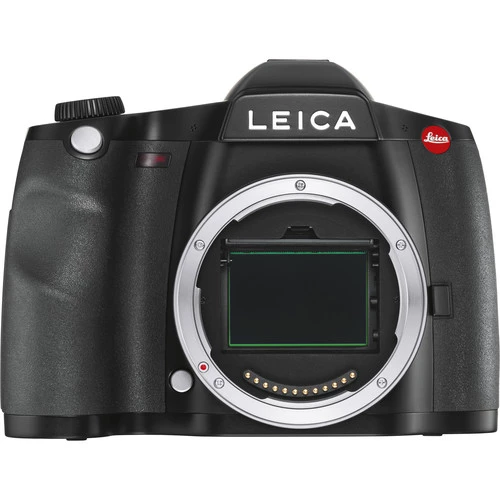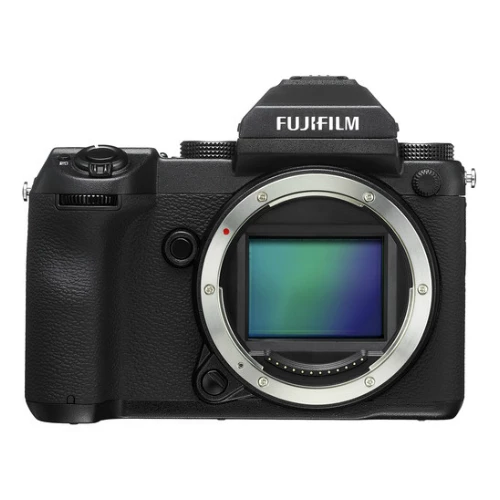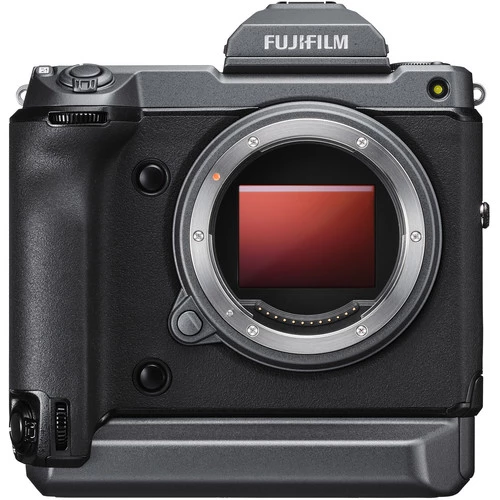Fujifilm GFX 100S Overview
Key Features
- 102MP 43.8 x 32.9mm BSI CMOS Sensor
- X-Processor 4 Image Processor
- 4K30 Video; F-Log Gamma, 12-Bit Raw Out
- 3.69m-Dot OLED EVF
- 3.2" 2.36m-Dot Tilting Touchscreen LCD
- 5-Axis Sensor-Shift Image Stabilization
- 425-Point Phase-Detection Autofocus
- ISO 100-12800, Up to 5 fps Shooting
- 400MP Pixel Shift Multi-Shot
- 19 Film Simulation Modes
Redefining medium format, the Fujifilm GFX 100S pairs an ultra high-resolution 102MP sensor with an impressively compact and portable mirrorless camera body design. Appealing to both photo and video needs, too, this camera is further rounded out by a durable construction, in-body image stabilization, and apt autofocus to make the camera more accessible and applicable for a variety of shooting needs.
At the heart of the GFX 100S platform is the 102MP 44 x 33mm BSI CMOS sensor, which offers the ultra-high resolution coveted by stills photographers as well impressive 4K video recording options, too. The sensor pairs with the X-Processor 4 in order to output 16-bit raw imagery with a broad dynamic Range, low noise levels, and sensitivity to a ISO 12800, and the BSI design of the sensor contributes to high clarity and accurate color rendering when working in a variety of lighting conditions. In terms of video, DCI and UHD 4K video recording is possible at 4:2:0 10-bit internally, 4:2:2 10-bit via HDMI, or raw 12-bit if recording externally, and an F-log gamma setting can also be used for more advanced color grading during post-production. Beyond high-resolution shooting, the unique sensor design also incorporates a sophisticated hybrid AF system that features 425 Selectable phase-detection points, which cover nearly the entire frame, and aid with precise face and eye-detection modes.
Balancing the awesome sensor design is a notably compact form factor, which opens up a Range of new working scenarios for this high-res platform. Sleek and lightweight, the portability of the GFX 100S is backed up by capable in-body image stabilization that compensates for up to 6 stops of camera shake for improved handheld shooting. Conversely, this stabilization system also enables making 400MP files using Pixel Shift Multi-Shot mode for extreme detail of still subjects. Also contributing to the sleek form factor is a fixed 3.69m-dot EVF for bright eye-level viewing and a rear 3.2" touchscreen LCD with a three-way tilting design.
102MP BSI CMOS Sensor and X-Processor 4
Utilizing a large and exceedingly high 102MP resolution 43.8 x 32.9mm BSI CMOS sensor and X-Processor 4, the GFX 100S is capable of delivering 16-bit stills with wide dynamic Range as well as a broad sensitivity Range of ISO 100-12800, which can be extended to ISO 50-102400. The large size of each pixel allows for more efficient light gathering, too, for smoother tonal and color transitions to produce a characteristic three-dimensional "medium format look." Also contributing to several medium format looks, a variety of traditional medium and large format aspect ratios can be used in addition to the standard 4:3, including 1:1, 65:24, 5:4, 7:6, 3:2, and 16:9.
The image processor and sensor also lend a versatile edge to the system, and permit shooting continuously up to 5 fps or for recording DCI and UHD 4K30 video.
UHD and DCI 4K Video Recording
Utilizing the large sensor size for more than just stills, the GFX 100S also offers an enticing array of video capabilities, including internal UHD and DCI 4K30p video recording at up 4:2:0 10-bit, as well as 4K30p 4:2:2 10-bit via HDMI output, both at up to 400 Mb/s-and simultaneous external and internal recording is possible. If working with an Atomos Ninja V, then UHD 4K30p raw 12-bit output is also possible using the Apple ProRes RAW format.
Greatly benefitting overall video performance, the speed of the quad-CPU X-Processor 4 enables fast read speeds when recording 4K video, which helps to reduce rolling shutter distortion when filming moving subjects.
In addition to the supported 10-bit color depth, the GFX 100 also includes the F-Log gamma setting, which provides a flat picture for use in advanced color grading software during editing. This maximizes the potential dynamic Range in difficult scenes and image adjustments can be made, as well, to highlight tone, shadow tone, color, and sharpness. HLG recording is supported, too, for HDR applications, and F-Log, HLG, and Film Simulations can all be used simultaneously with raw external output.
Also, the camera features a 3.5mm microphone jack and 3.5mm headphone jack for more advanced audio solutions.
Sensor-Shift Image Stabilization
Built-in 5-axis sensor-shift image stabilization helps to minimize the appearance of camera shake to better suit handheld shooting. This system works in conjunction with any lens, including non-stabilized ones, but when used with OIS-enabled lenses offers up to approximately 6 stops of shake reduction.
Body Design
- Updated body shape is noticeably more compact and lightweight than previous GFX 100 models, making it especially well-suited for handheld shooting on location and in studio environments.
- Magnesium alloy body construction is both lightweight and durable, and the camera system is weather sealed to render it moisture- and dust-resistant, as well as freezeproof down to 14°F, for use in inclement conditions.
- Fixed 3.69m-dot OLED electronic viewfinder is featured for high-resolution, 0.77x-magnification eye-level viewing.
- A 3.2" 2.36m-dot touchscreen LCD is also available for image playback, menu navigation, and live view shooting. This LCD features a unique three-way tilting design that moves both upward and downward for shooting from high and low angles, and also tilts to the side to benefit shooting in the vertical orientation when in live view.
- Single NP-W235 rechargeable lithium-ion battery is rated to provide approximately 460 shots per charge.
- Dual UHS-II SD memory card slots are featured, and permit saving imagery in a sequential manner, backup/duplicate manner, or in a sorted manner to segregate JPEG and raw files.
- The Fujifilm G lens mount features a short focal flange distance of just 26.7mm to better facilitate adapting lenses and to allow for reduced back focusing distances to better prevent vignetting and promote edge-to-edge sharpness with the GF series of lenses.
- A 1.8" sub LCD monitor on the top plate can be used to quickly view shooting settings and exposure data.
- Exposure mode dial on the top plate also incorporates six custom positions for quickly switching between pre-configured exposure settings.
- Integrated Bluetooth 4.2 low energy and Wi-Fi allows you to wirelessly share images to a mobile device or use the device to remotely control the camera.
Hybrid Autofocus System
The sensor's design also includes an expanded phase-detection autofocus system, which has 425 Selectable points that cover nearly the entire sensor area. This AF system delivers fast and accurate focusing performance along with low-light sensitivity down to -5.5 EV. Complementing the imaging and focusing capabilities, an updated X-Processor 4 is also featured, and delivers fast focus response for subject tracking and also supports Face- and Eye-Detection AF when working in AF-C mode and when recording video.
Other Camera Features
- Film Simulation modes allow you to reproduce the look and feel of several of Fujifilm's film types, including the newly introduced Nostalgic Neg. effect, along with Provia, Velvia, Astia, Classic Chrome, Classic Neg., Pro Neg. Hi, Pro Neg. Standard, Eterna, Eterna Bleach Bypass, Acros, Monochrome, and Sepia. Additionally, Grain Effect can be adjusted as well as Classic Chrome effect to fine-tune the look of imagery.
- Pixel-Shift Multi-Shot mode is capable of producing massive, 400MP images by combining 16 raw images using Fujifilm's Pixel Shift Combiner software, which can then be output as a DNG file for further processing using most popular editing software.
- Interval shooting is possible for up to 999 consecutive frames with a 1 sec to 24-hour delay between exposures, as well as up to a 24-hour shutter delay.
- Multiple Exposure mode lets you shoot two consecutive overlaid frames, and the first frame will be shown on the rear LCD to aid in alignment for the second exposure.
- A variety of file formats are available depending on your workflow needs and include uncompressed and compressed raw file types; Super Fine, Fine, and Normal JPEG settings; and TIFF files can be output via in-camera raw file development.
FUJIFILM GFX 50S II Overview
Key Features
- 51.4MP 43.8 x 32.9mm CMOS Sensor
- X-Processor 4 Image Processor
- 3.69m-Dot OLED EVF
- 3.2" 2.36m-Dot Tilting Touchscreen LCD
- 117-Point Contrast-Detection AF System
- Extended ISO 50-102400, 3 fps Shooting
- Full HD 1080p Video Recording at 30 fps
- Multi Aspect Ratio Shooting
- Film Simulation Modes
- Weather-Sealed Magnesium Alloy Body
Offering the perfect mix of accessibility and flexibility, the GFX 50S II from FUJIFILM is a unique medium format mirrorless camera that is wonderfully compact and portable. Featuring a 51.4MP CMOS sensor paired with an improved X-Processor 4 image processor, this camera produces files with extremely wide dynamic range and high resolution, as well as having an extended sensitivity range of ISO 50-102400 for working in difficult lighting conditions. The sensor's large form factor also achieves a unique three-dimensional look with especially smooth tonal and color transitions.
The GFX 50S II has also been updated with a five-axis in-body image stabilization system that negates up to 6.5 stops of camera shake for improved handheld shooting, providing dramatically broad creative possibilities for image makers wanting to work more freely with slower shutter speeds. For composing images, a 3.69m-dot electronic viewfinder can be used for high-resolution eye-level viewing, and a rear 3.2" 2.36m-dot touchscreen LCD features a three-way tilting design that supports working from high and low angles. Additionally, the GFX 50S II offers a magnesium alloy build that is both lightweight and durable and is also dust- and weather-sealed, as well as freezeproof down to 14°F, for working in harsh environmental conditions.
51.4MP CMOS Sensor and X-Processor 4

Utilizing a large, 43.8 x 32.9mm 51.4MP CMOS sensor and an improved X-Processor 4, the GFX 50S II is capable of delivering high-resolution, 14-bit stills with a broad sensitivity range of ISO 100-12800, which can be extended to ISO 50-102400. The large size of each pixel allows for more efficient light gathering, too, for smoother tonal and color transitions to produce a characteristic three-dimensional "medium format look." Also contributing to several medium format looks, a variety of traditional medium and large format aspect ratios can be used in addition to the standard 4:3, including 1:1, 65:24, 5:4, 7:6, 3:2, and 16:9. The image processor and sensor also permit shooting continuously up to 3 fps or for recording Full HD 1080p video at 29.97, 25, 24, and 23.98 fps frame rates.

Sensor-Shift Image Stabilization
Standing out from its predecessor, the GFX 50S II features an in-body image stabilization system that provides up to an impressive 6.5 stops of five-axis stabilization. This provides dramatically broad possibilities for image makers wanting to work more freely with slow shutter speeds.

117-Point Autofocus System
Complimenting the updated image processor is a 117-point autofocus system enabling razor-sharp responses, whether subject tracking or picking out a face in a crowd. An improved autofocusing algorithm boosts focusing performance in all modes, including face and eye detection.
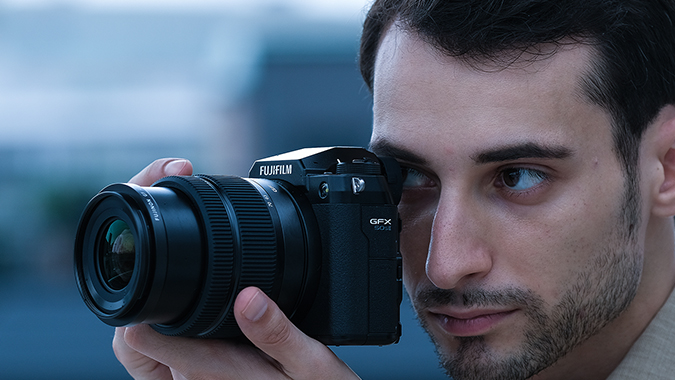
Additional Camera Features
- The FUJIFILM G lens mount features a short focal flange distance of just 26.7mm to better facilitate adapting lenses and to allow for reduced back focusing distances to better prevent vignetting and promote edge-to-edge sharpness with the GF series of lenses.
- Film Simulation modes allow you to reproduce the look and feel of 19 of FUJIFILM's film types, including Provia, Velvia, Astia, Eterna, Classic Chrome, Classic Neg., Pro Neg. Hi, Pro Neg. Standard, Acros, Monochrome, and Sepia. Additionally, Grain Effect can be adjusted as well as Classic Chrome effect to fine-tune the look of imagery.
- Mechanical focal plane permits working with shutter speeds from 60 min. up to 1/4000 sec, and an electronic shutter allows the use of shutter speeds up to 1/16000 sec for working in bright light conditions.
- Dual SD memory card slots are featured, and permit saving imagery in a sequential manner, backup/duplicate manner, or in a sorted manner to segregate JPEG and raw files.
- Tethered shooting is possible using X Acquire software to send images from the camera to a hot folder on your computer for further editing. Alternatively, the Tether Shooting Plug-in PRO for Adobe Photoshop Lightroom and HS-V5 for Windows operating systems are also available.
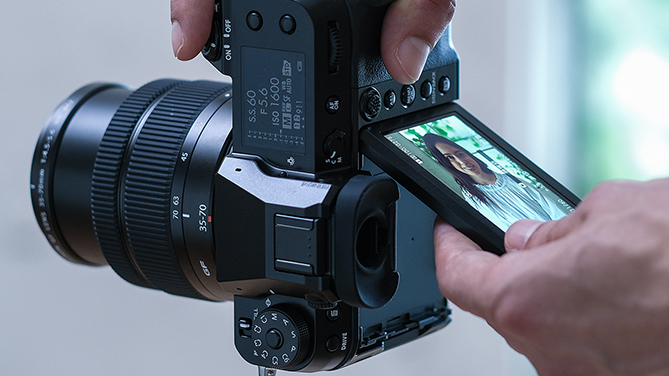
Body Design
- 3.69m-dot electronic viewfinder is included for high-resolution, 0.77x-magnification eye-level viewing.
- A 3.2" 2.36m-dot touchscreen LCD is also available for image playback, menu navigation, and live view shooting.
- LCD monitor is also featured on the top plate for settings confirmation and exposure data.
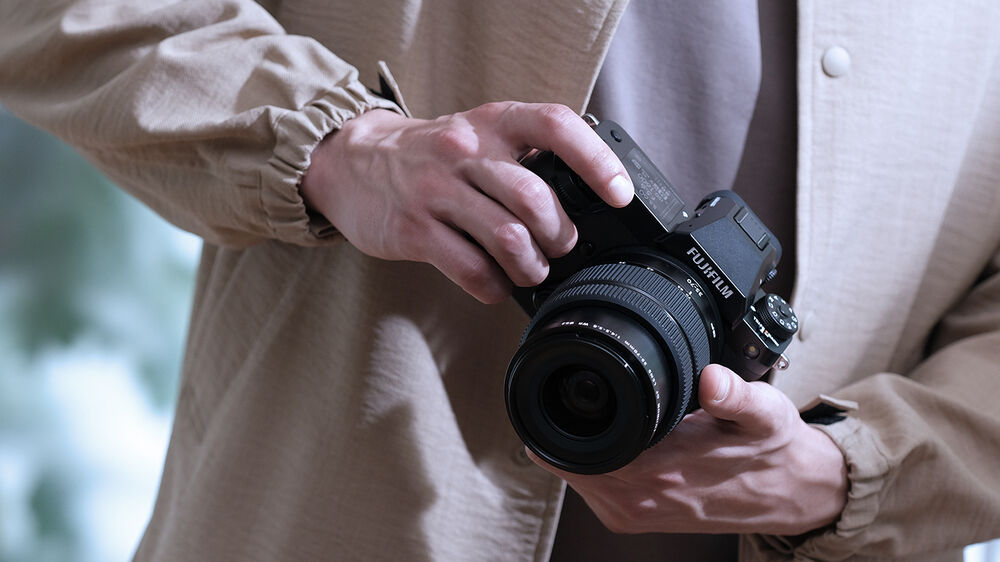
- Single NP-W235 rechargeable lithium-ion battery is rated to provide approximately 440 shots per charge.
- Built-in Wi-Fi allows for direct wireless sharing of files as well as remote camera control from a linked mobile device.
Hasselblad X1D II 50c Overview
Continuing To take medium format out of the studio, the Hasselblad X1D II 50C is a sleek and exceptionally capable mirrorless camera, characterized by its thoughtful design and powerful imaging capabilities. This second-generation X System camera shows a revised and enhanced feature-set designed To quicken performance and make overall operation even more intuitive and streamlined. At the core of the X1D II remains the large 43.8 x 32.9mm 50MP CMOS sensor, which yields high-resolution imagery with a wide 14-stop dynamic range, 16-bit color depth, and an ISO 100-25600 sensitivity range. This sensor utilizes Hasselblad Natural Color Solution, too, which delivers realistic, pleasing color tones for great consistency and smooth tonal transitions. An updated electronic platform also enables a faster 2.7 fps continuous shooting rate as well as a faster startup time, reduced shutter lag and blackout times, and more responsive autofocus performance.
Balancing the imaging capabilities, the X1D II is also distinguished by an updated body with a larger 3.6" 2.36m-dot touchscreen LCD and a 0.87x-magnification 3.39m-dot OLED electronic viewfinder. These work in concert To provide more comfortable and easy viewing means for shooting in a variety of conditions. The X1D II also retains the signature physical design, with an especially deep right-hand grip and smooth aluminum alloy body. The svelte overall form factor is due in part To the leaf shutter design of the XCD lenses, which obviates the need for a camera-based shutter system and affords full flash sync throughout the shutter speed range up To 1/2000 sec. Additionally, built-in Wi-Fi permits wireless remote control and file transferring via Phocus Mobile 2 and an integrated GPS module enables recording location data for geotagging.
Covering a useful wide-angle To short-telephoto range, the XCD 35-75mm f3.5-4.5 from Hasselblad is a 28-58mm-equivalent zoom designed for X-series mirrorless medium format cameras. The useful zoom range is complemented by an overall compact, lightweight design that makes this lens especially suitable for travel applications. Its optical design incorporates a pair of aspherical elements, which help To reduce distortion and spherical aberrations throughout the zoom range in order To achieve a high degree of sharpness and accurate rendering. Like other XCD lenses, the 35-75mm f3.5-4.5 has an integrated Central Lens Shutter that is capable of shutter speeds up To 1/2000 sec with flash sync at all speeds, and its autofocus system, which uses an internal focusing design, can be manually overridden for fine-tuned focusing control.
Hasselblad XCD 35-75mm f3.5-4.5 Overview
Covering a useful wide-angle To short-telephoto range, the XCD 35-75mm f3.5-4.5 from Hasselblad is a 28-58mm-equivalent zoom designed for X-series mirrorless medium format cameras. The useful zoom range is complemented by an overall compact, lightweight design that makes this lens especially suitable for travel applications. Its optical design incorporates a pair of aspherical elements, which help To reduce distortion and spherical aberrations throughout the zoom range in order To achieve a high degree of sharpness and accurate rendering. Like other XCD lenses, the 35-75mm f3.5-4.5 has an integrated Central Lens Shutter that is capable of shutter speeds up To 1/2000 sec with flash sync at all speeds, and its autofocus system, which uses an internal focusing design, can be manually overridden for fine-tuned focusing control.
Hasselblad X1D II 50c Overview
Continuing To take medium format out of the studio, the Hasselblad X1D II 50C is a sleek and exceptionally capable mirrorless camera, characterized by its thoughtful design and powerful imaging capabilities. This second-generation X System camera shows a revised and enhanced feature-set designed To quicken performance and make overall operation even more intuitive and streamlined. At the core of the X1D II remains the large 43.8 x 32.9mm 50MP CMOS sensor, which yields high-resolution imagery with a wide 14-stop dynamic range, 16-bit color depth, and an ISO 100-25600 sensitivity range. This sensor utilizes Hasselblad Natural Color Solution, too, which delivers realistic, pleasing color tones for great consistency and smooth tonal transitions. An updated electronic platform also enables a faster 2.7 fps continuous shooting rate as well as a faster startup time, reduced shutter lag and blackout times, and more responsive autofocus performance.
Balancing the imaging capabilities, the X1D II is also distinguished by an updated body with a larger 3.6" 2.36m-dot touchscreen LCD and a 0.87x-magnification 3.39m-dot OLED electronic viewfinder. These work in concert To provide more comfortable and easy viewing means for shooting in a variety of conditions. The X1D II also retains the signature physical design, with an especially deep right-hand grip and smooth aluminum alloy body. The svelte overall form factor is due in part To the leaf shutter design of the XCD lenses, which obviates the need for a camera-based shutter system and affords full flash sync throughout the shutter speed range up To 1/2000 sec. Additionally, built-in Wi-Fi permits wireless remote control and file transferring via Phocus Mobile 2 and an integrated GPS module enables recording location data for geotagging.
Hasselblad XCD 90mm f3.2 Overview
Providing a flattering short telephoto perspective equivalent To 71mm on full-frame sensor, this exceptional XCD 90mm f3.2 Lens from Hasselblad will allow users of the mirrorless X system To realize the full potential of their medium format system. It also offers a huge advantage in the form of an integrated Central Lens Shutter capable of flash sync up To 1/2000 second. During general use it can focus as close as 2.3' and offers autofocus with internal focusing and full-time manual focus override. Additionally, it has a 67mm front filter thread.
Hasselblad X1D II 50c Overview
Continuing to take medium format out of the studio, the Hasselblad X1D II 50C is a sleek and exceptionally capable mirrorless camera, characterized by its thoughtful design and powerful imaging capabilities. This second-generation X System camera shows a revised and enhanced feature-set designed to quicken performance and make overall operation even more intuitive and streamlined. At the core of the X1D II remains the large 43.8 x 32.9mm 50MP CMOS sensor, which yields high-resolution imagery with a wide 14-stop dynamic range, 16-bit color depth, and an ISO 100-25600 sensitivity range. This sensor utilizes Hasselblad's Natural Color Solution, too, which delivers realistic, pleasing color tones for great consistency and smooth tonal transitions. An updated electronic platform also enables a faster 2.7 fps continuous shooting rate as well as a faster startup time, reduced shutter lag and blackout times, and more responsive autofocus performance.
Balancing the imaging capabilities, the X1D II is also distinguished by an updated body with a larger 3.6" 2.36m-dot touchscreen LCD and a 0.87x-magnification 3.39m-dot OLED electronic viewfinder. These work in concert to provide more comfortable and easy viewing means for shooting in a variety of conditions. The X1D II also retains the signature physical design, with an especially deep right-hand grip and smooth aluminum alloy body. The svelte overall form factor is due in part to the leaf shutter design of the XCD lenses, which obviates the need for a camera-based shutter system and affords full flash sync throughout the shutter speed range up to 1/2000 sec. Additionally, built-in Wi-Fi permits wireless remote control and file transferring via Phocus Mobile 2 and an integrated GPS module enables recording location data for geotagging.
50MP CMOS Sensor and Hasselblad Natural Color Solution
Revolving around a large 50MP CMOS sensor, measuring 43.8 x 32.9mm, the X1D-50c is capable of capturing an extremely wide dynamic range of up to 14 stops along with vivid 16-bit color depth. When combined with the Hasselblad Natural Color Solution, tonal transitions and skin tones show immense depth, detail, and clarity for lifelike image quality, even in dark shadow and bright highlight regions. To suit working in a variety of lighting conditions, a sensitivity range of ISO 100-25600 is available, and still files are saved in the Hasselblad 3FR raw file format or as JPEGs.
Working with the spectacular image quality of the 50MP CMOS sensor, the Hasselblad Natural Color Solution is designed to deliver images with the most natural color without needing to delve into a variety of presets. This system is also capable of creating imagery with exceptionally smooth tonal transitions that are reminiscent of analog film capture, which is thanks in part to the X1D II's 16-bit color depth.
Body Design
- Large 3.6" 2.36m-dot (1024 x 768) rear LCD features a touchscreen design for intuitive control, menu navigation, and playback. The updated screen also has a fast 60 fps refresh rate for more fluid playback and the screen also supports autofocus point drag and drop placement and autofocus point size changes with pinch/spread finger movement.
- Enhanced 3.69m-dot (1280 x 960) OLED electronic viewfinder features a high 0.87x magnification for bright and clear eye-level viewing. The increased resolution benefits manual focus accuracy and the menu system can also be viewed through the EVF for more intuitive adjustment when working in bright conditions.
- Dual SD memory card slots both support the UHS-II protocol for faster read/write speeds.
- Built-in Wi-Fi permits wireless sharing of files as well as remote camera control. Additionally, Phocus Mobile 2 allows for a rich tethered shooting experience from an iPad Pro or iPad Air (2019).
- USB 3.0 Type-C connector can be used for file transfer, tethered shooting from an iPad, or for in-camera battery charging via a computer, charger, or power bank.
- Integrated GPS module can be used for recording location details to image files for geotagging applications.
- Distinctly ergonomic and stylish body design uses a milled aluminum alloy chassis with a clean surface finish and minimal number of buttons and dials for a more streamlined user interface. Additionally, due to the inclusion leaf shutters within the lenses, the overall body's design can be significantly reduced for a more compact and lightweight form factor.
Other Camera Features
- Updated electronic platform realizes faster overall performance, including a 46% faster startup time, reduced shutter lag and blackout times, as well as more responsive autofocus compared to the first generation X1D.
- Optimized for use with XCD series of lenses, which offer an integrated central shutter system, capable of sync speeds up to 1/2000 sec.
- Phocus Mobile 2, available for iPad Pro and iPad Air (2019), permits importing, editing, and rating of raw images as well as importing and rating full-resolution JPEG images directly on a tablet. Additionally, Phocus Mobile 2 supports full-resolution image export, tethered shooting, and direct camera control.
- Conventional computer-based tethered shooting is supported via the desktop version of Phocus.
Hasselblad XCD 65mm f/2.8 Overview
An all-arounder for the Hasselblad X-series of medium format mirrorless cameras, the XCD 65mm f/2.8 is a 50mm-equivalent prime offering a natural field of view to suit working in a broad variety of shooting situations. The f/2.8 maximum aperture strikes a balance between a sleek form factor and being adept in difficult lighting conditions. For working with close-up subjects, a minimum focusing distance of 1.6' is possible and a 10-elements-in-six-groups optical design helps to realize high sharpness and clarity. Like other XCD lenses, the 65mm f/2.8 has an integrated Central Lens Shutter that is capable of shutter speeds up to 1/2000 sec with flash sync at all speeds, and its internal autofocus design can be manually overridden for precise manual focusing control.
Hasselblad X1D II 50c Overview
Continuing to take medium format out of the studio, the Hasselblad X1D II 50C is a sleek and exceptionally capable mirrorless camera, characterized by its thoughtful design and powerful imaging capabilities. This second-generation X System camera shows a revised and enhanced feature-set designed to quicken performance and make overall operation even more intuitive and streamlined. At the core of the X1D II remains the large 43.8 x 32.9mm 50MP CMOS sensor, which yields high-resolution imagery with a wide 14-stop dynamic range, 16-bit color depth, and an ISO 100-25600 sensitivity range. This sensor utilizes Hasselblad's Natural Color Solution, too, which delivers realistic, pleasing color tones for great consistency and smooth tonal transitions. An updated electronic platform also enables a faster 2.7 fps continuous shooting rate as well as a faster startup time, reduced shutter lag and blackout times, and more responsive autofocus performance.
Balancing the imaging capabilities, the X1D II is also distinguished by an updated body with a larger 3.6" 2.36m-dot touchscreen LCD and a 0.87x-magnification 3.39m-dot OLED electronic viewfinder. These work in concert to provide more comfortable and easy viewing means for shooting in a variety of conditions. The X1D II also retains the signature physical design, with an especially deep right-hand grip and smooth aluminum alloy body. The svelte overall form factor is due in part to the leaf shutter design of the XCD lenses, which obviates the need for a camera-based shutter system and affords full flash sync throughout the shutter speed range up to 1/2000 sec. Additionally, built-in Wi-Fi permits wireless remote control and file transferring via Phocus Mobile 2 and an integrated GPS module enables recording location data for geotagging.
50MP CMOS Sensor and Hasselblad Natural Color Solution
Revolving around a large 50MP CMOS sensor, measuring 43.8 x 32.9mm, the X1D-50c is capable of capturing an extremely wide dynamic range of up to 14 stops along with vivid 16-bit color depth. When combined with the Hasselblad Natural Color Solution, tonal transitions and skin tones show immense depth, detail, and clarity for lifelike image quality, even in dark shadow and bright highlight regions. To suit working in a variety of lighting conditions, a sensitivity range of ISO 100-25600 is available, and still files are saved in the Hasselblad 3FR raw file format or as JPEGs.
Working with the spectacular image quality of the 50MP CMOS sensor, the Hasselblad Natural Color Solution is designed to deliver images with the most natural color without needing to delve into a variety of presets. This system is also capable of creating imagery with exceptionally smooth tonal transitions that are reminiscent of analog film capture, which is thanks in part to the X1D II's 16-bit color depth.
Body Design
- Large 3.6" 2.36m-dot (1024 x 768) rear LCD features a touchscreen design for intuitive control, menu navigation, and playback. The updated screen also has a fast 60 fps refresh rate for more fluid playback and the screen also supports autofocus point drag and drop placement and autofocus point size changes with pinch/spread finger movement.
- Enhanced 3.69m-dot (1280 x 960) OLED electronic viewfinder features a high 0.87x magnification for bright and clear eye-level viewing. The increased resolution benefits manual focus accuracy and the menu system can also be viewed through the EVF for more intuitive adjustment when working in bright conditions.
- Dual SD memory card slots both support the UHS-II protocol for faster read/write speeds.
- Built-in Wi-Fi permits wireless sharing of files as well as remote camera control. Additionally, Phocus Mobile 2 allows for a rich tethered shooting experience from an iPad Pro or iPad Air (2019).
- USB 3.0 Type-C connector can be used for file transfer, tethered shooting from an iPad, or for in-camera battery charging via a computer, charger, or power bank.
- Integrated GPS module can be used for recording location details to image files for geotagging applications.
- Distinctly ergonomic and stylish body design uses a milled aluminum alloy chassis with a clean surface finish and minimal number of buttons and dials for a more streamlined user interface. Additionally, due to the inclusion leaf shutters within the lenses, the overall body's design can be significantly reduced for a more compact and lightweight form factor.
Other Camera Features
- Updated electronic platform realizes faster overall performance, including a 46% faster startup time, reduced shutter lag and blackout times, as well as more responsive autofocus compared to the first generation X1D.
- Optimized for use with XCD series of lenses, which offer an integrated central shutter system, capable of sync speeds up to 1/2000 sec.
- Phocus Mobile 2, available for iPad Pro and iPad Air (2019), permits importing, editing, and rating of raw images as well as importing and rating full-resolution JPEG images directly on a tablet. Additionally, Phocus Mobile 2 supports full-resolution image export, tethered shooting, and direct camera control.
- Conventional computer-based tethered shooting is supported via the desktop version of Phocus.
Hasselblad XCD 21mm f/4 Overview
Presenting an ultra-wide field of view, the XCD 21mm f/4 is a 17mm-equivalent wide-angle prime designed for Hasselblad's mirrorless medium format XCD system. Well suited for landscape, interior, and architectural photography, this lens is also characterized by its close minimum focusing distance of 1' for creative close-up imaging. Matching the sophistication of the system, this lens features a pair of aspherical elements in its optical design, which helps to reduce spherical aberrations and distortion in order to realize high sharpness and accurate rendering. Like other XCD lenses, the 21mm f/4 has an integrated Central Lens Shutter that is capable of shutter speeds up to 1/2000 sec with flash sync at all speeds, and its internal autofocus design can be manually overridden for precise manual focusing control.
Hasselblad 907X 50C Overview
Key Features
- 907X Camera and CFV II 50C Digital Back
- 50MP 43.8 x 32.9mm CMOS Sensor
- 16-Bit Color, 14-Stop Dynamic Range
- Hasselblad Natural Color Solution
- 3.2" 2.4m -Dot Tilting Touchscreen LCD
- Leaf Shutter System, 1/2000 sec Sync
- ISO 100-25600, Up to 2.7 fps Shooting
- 2.7K and 1080p HD Video
- Dual SD UHS-II Memory Card Slots
- Built-In Wi-Fi, USB 3.0 Type-C
Uniquely modular, the Hasselblad 907X 50C is a medium format camera system meshing design elements from their classic film cameras with contemporary imaging capabilities from their digital era. The 907X 50C platform comprises the matched CFV II 50C digital back and 907X camera body, which work in tandem as a distinct and versatile camera system.
The 907X has the distinction of being the smallest medium format camera Hasselblad has ever created, measuring just over an inch thick, as well as the lightest, at 7 oz. Recalling the form of the famed 500-series V-system cameras, though, this simple camera body mainly serves as the interface between the V interface of the CFV II 50C digital back and the X-mount for working with XCD lenses or adapted lenses from other mounts.
The CFV II 50C is an updated and refined digital back featuring a classic V-system interface for use on the included 907X as well as virtually any Hasselblad V camera from 1957 onward. Designed with the classic A12 and A16 film backs in mind, this digital back has been outfitted with versatile digital capabilities, revolving around a 43.8 x 32.9mm 50MP CMOS sensor, which yields high-resolution imagery with a wide 14-stop dynamic range, 16-bit color depth, and an ISO 100-25600 sensitivity range. This sensor utilizes Hasselblad's Natural Color Solution, too, which delivers realistic, pleasing color tones for great consistency and smooth tonal transitions. The back's design also incorporates a rear 3.2" 2.4m-dot tilting touchscreen LCD, to recall the experience of working with a waist-level finder, and it now houses the rechargeable lithium-ion battery internally for a sleeker overall profile. Additionally, built-in Wi-Fi permits wireless remote control and file transferring via Phocus Mobile 2.
907X Camera Body

Characterized by its impressively compact, lightweight design, the 907X is Hasselblad's smallest medium format camera body and serves as the inconspicuous interface between the V-system interface CFV II 50C digital back and the range of X-system mirrorless lenses. By providing an X-system lens mount, this opens up the opportunity to pair the CFV II with the autofocus and leaf shutter-enabled XCD lenses, as well as HC, HCD, V, XPan, and other third-party lenses via optional adapters. Use of the 907X also enables greater access to wide-angle lens options, compared to the V system, when using XCD lenses.
CFV II 50C Digital Back

50MP CMOS Sensor and Hasselblad Natural Color Solution
Revolving around a large 50MP CMOS sensor, measuring 43.8 x 32.9mm, the CFV II 50C is capable of capturing an extremely wide dynamic range of up to 14 stops along with vivid 16-bit color depth. When combined with the Hasselblad Natural Color Solution, tonal transitions and skin tones show immense depth, detail, and clarity for lifelike image quality, even in dark shadow and bright highlight regions. To suit working in a variety of lighting conditions, a sensitivity range of ISO 100-25600 is available, and still files are saved in the Hasselblad 3FR raw file format or as JPEGs.

Working with the spectacular image quality of the 50MP CMOS sensor, the Hasselblad Natural Color Solution is designed to deliver images with the most natural color without needing to delve into a variety of presets. This system is also capable of creating imagery with exceptionally smooth tonal transitions that are reminiscent of analog film capture, which is thanks in part to the CFV II's 16-bit color depth.
In addition to capturing breathtaking still images, the CFV II 50C is also capable of capturing high resolution video, shooting at 2.7K (2720 x 1530) and HD (1920 x 1080), using the full sensor width in a 16:9 ratio. The video is recorded using an H.264 compressed codec at 29,97 fps, for up to 29 minutes, 59 seconds. A 3.5mm mini-phono input port allows the use of an external microphone while recording video.
Back Design
- Using a V-system interface, this digital back can be used in conjunction with the included 907X camera body, with virtually any Hasselblad V system film camera from 1957 or later, or with technical and view cameras featuring a V-system mounting interface.
- Integrated 3.2" 2.4m-dot tilting LCD features a touchscreen design for intuitive control, menu navigation, and playback. The updated screen also has a fast 60 fps refresh rate for more fluid playback and the screen also supports autofocus point drag and drop placement and autofocus point size changes with pinch/spread finger movement. The screen's tilting design also reinforces a top-down viewing position, akin to working with an optical waist-level finder.
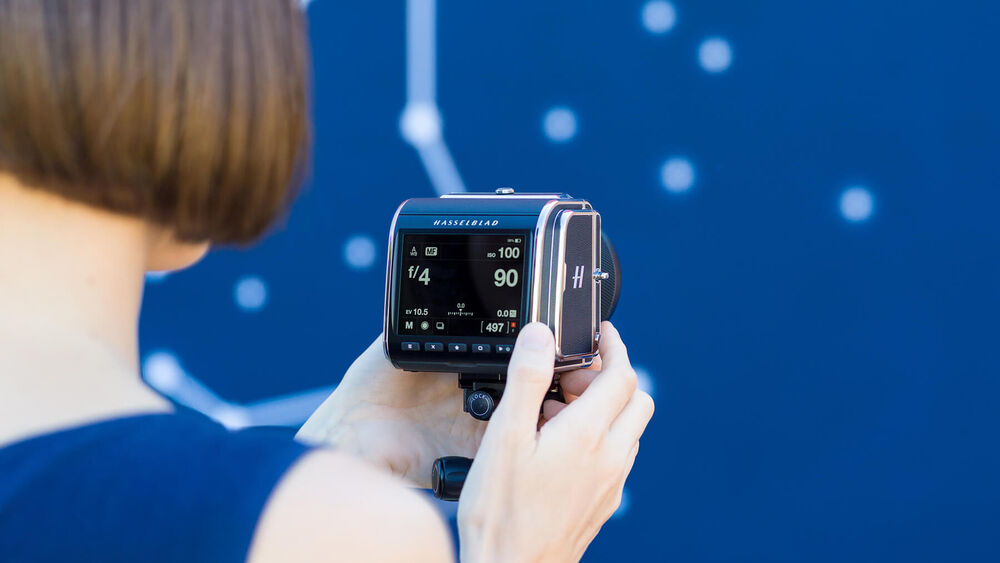
- Accepts one rechargeable lithium-ion battery internally in order to maintain the overall svelte profile reminiscent of A12 and A16 film backs. This battery can be charged in-back, too, via the USB Type-C port.
- Dual SD memory card slots both support the UHS-II protocol for faster read/write speeds.
- Built-in Wi-Fi permits wireless sharing of files as well as remote camera control. Additionally, Phocus Mobile 2 allows for a rich tethered shooting experience from an iPad Pro or iPad Air (2019).
- USB 3.0 Type-C connector can be used for file transfer, tethered shooting from an iPad, or for in-camera battery charging via a computer, charger, or power bank.
- Optimized for use with XCD series of lenses, which offer an integrated central shutter system, capable of sync speeds up to 1/2000 sec.
- Phocus Mobile 2, available for select iPad models, permits importing, editing, and rating of raw images as well as importing and rating full-resolution JPEG images directly on a tablet. Additionally, Phocus Mobile 2 supports full-resolution image export, tethered shooting, and direct camera control.
- Conventional computer-based tethered shooting is supported via the desktop version of Phocus.
Hasselblad 907X Overview
Celebrating the 50th anniversary of the Apollo 11 moon landing on July 20th, 1969, the Hasselblad 907X Special Edition is a highly modular medium format camera system recalling the famous Hasselblad cameras from the historic lunar mission. This limited edition camera comprises the matched CFV II 50C digital back and 907X camera body, both finished in matte black, and the body has been accentuated with the text "On the Moon Since 1969."
The 907X has the distinction of being the smallest medium format camera Hasselblad has ever created, measuring just over an Inch thick, as well as the lightest, at 7.3 oz. Recalling the form of the famed 500-series V-system cameras, though, this simple camera body mainly serves as the interface between the V interface of the CFV II 50C digital back and the X-mount for working with XCD lenses or adapted lenses from other mounts.
The CFV II 50C is an updated and refined digital back featuring a classic V-system interface for use on the included 907X as well as virtually any Hasselblad V camera from 1957 onward. Designed with the classic A12 and A16 film backs in mind, this digital back has been outfitted with versatile digital capabilities, revolving around a 43.8 x 32.9mm 50MP CMOS sensor, which yields high-resolution imagery with a wide 14-stop dynamic Range, 16-bit color depth, and an ISO 100-25600 sensitivity Range. This sensor utilizes Hasselblad's Natural Color Solution, too, which delivers realistic, pleasing color tones for great consistency and smooth tonal transitions. The back's design also incorporates a rear 3.0" 920k-dot tilting touchscreen LCD, to recall the experience of working with a waist-level finder, and it now houses the rechargeable lithium-ion battery internally for a sleeker overall profile. Additionally, built-in Wi-Fi permits wireless remote control and file transferring via Phocus Mobile 2 and an integrated GPS module enables recording location data for geotagging.
907X Special Edition
On the Moon Since 1969
Commemorating the 50th anniversary of the Apollo 11 moon landing, this Special Edition of the 907X camera body and CFV II 50C digital back celebrates Hasselblad's involvement in the historic moment and pays homage to their cameras left behind on the moon. Reminiscent of the black finish of two of the three Hasselblad cameras from the Apollo 11 mission, the 907X Special Edition features a distinct matte black finish on both the body and the back, and the CFV II 50C back is also emblazoned with the text "On the Moon Since 1969."
907X Camera Body
Characterized by its impressively compact, lightweight design, the 907X is Hasselblad's smallest medium format camera body and serves as the inconspicuous interface between the V-system interface CFV II 50C digital back and the Range of X-system mirrorless lenses. By providing an X-system lens mount, this opens up the opportunity to pair the CFV II with the autofocus and leaf shutter-enabled XCD lenses, as well as HC, HCD, V, XPan, and other third-party lenses via optional adapters. Use of the 907X also enables greater access to wide-angle lens options, compared to the V system, when using XCD lenses.
CFV II 50C Digital Back
50MP CMOS Sensor and Hasselblad Natural Color Solution
Revolving around a large 50MP CMOS sensor, measuring 43.8 x 32.9mm, the CFV II 50C is capable of capturing an extremely wide dynamic Range of up to 14 stops along with vivid 16-bit color depth. When combined with the Hasselblad Natural Color Solution, tonal transitions and skin tones show immense depth, detail, and clarity for lifelike image quality, even in dark shadow and bright highlight regions. To suit working in a variety of lighting conditions, a sensitivity Range of ISO 100-25600 is available, and still files are saved in the Hasselblad 3FR raw file format or as JPEGs.
Working with the spectacular image quality of the 50MP CMOS sensor, the Hasselblad Natural Color Solution is designed to deliver images with the most natural color without needing to delve into a variety of presets. This system is also capable of creating imagery with exceptionally smooth tonal transitions that are reminiscent of analog film capture, which is thanks in part to the CFV II's 16-bit color depth.
Back Design
- Using a V-system interface, this digital back can be used in conjunction with the included 907X camera body, with virtually any Hasselblad V system film camera from 1957 or later, or with technical and view cameras featuring a V-system mounting interface.
- Integrated 3.0" 920k-dot tilting LCD features a touchscreen design for intuitive control, menu navigation, and playback. The updated screen also has a fast 60 fps refresh rate for more fluid playback and the screen also supports autofocus point drag and drop placement and autofocus point size changes with pInch/spread finger movement. The screen's tilting design also reinforces a top-down viewing position, akin to working with an optical waist-level finder.
- Accepts one rechargeable lithium-ion battery internally in order to maintain the overall svelte profile reminiscent of A12 and A16 film backs. This battery can be charged in-back, too, via the USB Type-C port.
- Dual SD memory card slots both support the UHS-II protocol for faster read/write speeds.
- Built-in Wi-Fi permits wireless sharing of files as well as remote camera control. Additionally, Phocus Mobile 2 allows for a rich tethered shooting experience from an iPad Pro or iPad Air (2019).
- USB 3.0 Type-C connector can be used for file transfer, tethered shooting from an iPad, or for in-camera battery charging via a computer, charger, or power bank.
- Integrated GPS module can be used for recording location details to image files for geotagging applications.
- Optimized for use with XCD series of lenses, which offer an integrated central shutter system, capable of sync speeds up to 1/2000 sec.
- Phocus Mobile 2, available for iPad Pro and iPad Air (2019), permits importing, editing, and rating of raw images as well as importing and rating full-resolution JPEG images directly on a tablet. Additionally, Phocus Mobile 2 supports full-resolution image export, tethered shooting, and direct camera control.
- Conventional computer-based tethered shooting is supported via the desktop version of Phocus.
Hasselblad X1D II 50c Overview
Continuing to take medium format out of the studio, the Hasselblad X1D II 50C is a sleek and exceptionally capable mirrorless camera, characterized by its thoughtful design and powerful imaging capabilities. This second-generation X System camera shows a revised and enhanced feature-set designed to quicken performance and make overall operation even more intuitive and streamlined. At the core of the X1D II remains the large 43.8 x 32.9mm 50MP CMOS sensor, which yields high-resolution imagery with a wide 14-stop dynamic range, 16-bit color depth, and an ISO 100-25600 sensitivity range. This sensor utilizes Hasselblad's Natural Color Solution, too, which delivers realistic, pleasing color tones for great consistency and smooth tonal transitions. An updated electronic platform also enables a faster 2.7 fps continuous shooting rate as well as a faster startup time, reduced shutter lag and blackout times, and more responsive autofocus performance.
Balancing the imaging capabilities, the X1D II is also distinguished by an updated body with a larger 3.6" 2.36m-dot touchscreen LCD and a 0.87x-magnification 3.39m-dot OLED electronic viewfinder. These work in concert to provide more comfortable and easy viewing means for shooting in a variety of conditions. The X1D II also retains the signature physical design, with an especially deep right-hand grip and smooth aluminum alloy body. The svelte overall form factor is due in part to the leaf shutter design of the XCD lenses, which obviates the need for a camera-based shutter system and affords full flash sync throughout the shutter speed range up to 1/2000 sec. Additionally, built-in Wi-Fi permits wireless remote control and file transferring via Phocus Mobile 2 and an integrated GPS module enables recording location data for geotagging.
50MP CMOS Sensor and Hasselblad Natural Color Solution
Revolving around a large 50MP CMOS sensor, measuring 43.8 x 32.9mm, the X1D-50c is capable of capturing an extremely wide dynamic range of up to 14 stops along with vivid 16-bit color depth. When combined with the Hasselblad Natural Color Solution, tonal transitions and skin tones show immense depth, detail, and clarity for lifelike image quality, even in dark shadow and bright highlight regions. To suit working in a variety of lighting conditions, a sensitivity range of ISO 100-25600 is available, and still files are saved in the Hasselblad 3FR raw file format or as JPEGs.
Working with the spectacular image quality of the 50MP CMOS sensor, the Hasselblad Natural Color Solution is designed to deliver images with the most natural color without needing to delve into a variety of presets. This system is also capable of creating imagery with exceptionally smooth tonal transitions that are reminiscent of analog film capture, which is thanks in part to the X1D II's 16-bit color depth.
Body Design
- Large 3.6" 2.36m-dot (1024 x 768) rear LCD features a touchscreen design for intuitive control, menu navigation, and playback. The updated screen also has a fast 60 fps refresh rate for more fluid playback and the screen also supports autofocus point drag and drop placement and autofocus point size changes with pinch/spread finger movement.
- Enhanced 3.69m-dot (1280 x 960) OLED electronic viewfinder features a high 0.87x magnification for bright and clear eye-level viewing. The increased resolution benefits manual focus accuracy and the menu system can also be viewed through the EVF for more intuitive adjustment when working in bright conditions.
- Dual SD memory card slots both support the UHS-II protocol for faster read/write speeds.
- Built-in Wi-Fi permits wireless sharing of files as well as remote camera control. Additionally, Phocus Mobile 2 allows for a rich tethered shooting experience from an iPad Pro or iPad Air (2019).
- USB 3.0 Type-C connector can be used for file transfer, tethered shooting from an iPad, or for in-camera battery charging via a computer, charger, or power bank.
- Integrated GPS module can be used for recording location details to image files for geotagging applications.
- Distinctly ergonomic and stylish body design uses a milled aluminum alloy chassis with a clean surface finish and minimal number of buttons and dials for a more streamlined user interface. Additionally, due to the inclusion leaf shutters within the lenses, the overall body's design can be significantly reduced for a more compact and lightweight form factor.
Other Camera Features
- Updated electronic platform realizes faster overall performance, including a 46% faster startup time, reduced shutter lag and blackout times, as well as more responsive autofocus compared to the first generation X1D.
- Optimized for use with XCD series of lenses, which offer an integrated central shutter system, capable of sync speeds up to 1/2000 sec.
- Phocus Mobile 2, available for iPad Pro and iPad Air (2019), permits importing, editing, and rating of raw images as well as importing and rating full-resolution JPEG images directly on a tablet. Additionally, Phocus Mobile 2 supports full-resolution image export, tethered shooting, and direct camera control.
- Conventional computer-based tethered shooting is supported via the desktop version of Phocus.
Hasselblad XCD 45mm f/3.5 Overview
Incorporating exceptional optics and beautiful a design signature of Hasselblad, the XCD 45mm f/3.5 Lens will deliver crisp, finely detailed images for the mirrorless X system. Covering a large 44 x 33mm sensor area, this lens provides a wide angle 35mm equivalent focal lent when compared to more common full-frame sensors. It also offers a huge advantage in the form of an integrated Central Lens Shutter capable of flash sync up to 1/2000 second. During general use it can focus as close as 1.3' and offers autofocus with internal focusing and full-time manual focus override. Additionally, it has a 67mm front filter thread.
Hasselblad X1D II 50C Medium Format Mirrorless Camera
Key Features
- 50MP 43.8 x 32.9mm CMOS Sensor
- 16-Bit Color, 14-Stop Dynamic Range
- Hasselblad Natural Color Solution
- 0.87x 3.69m-Dot Electronic Viewfinder
- 3.6" 2.36m-Dot Touchscreen LCD
- Leaf Shutter System, 1/2000 sec Sync
- ISO 100-25600, Up to 2.7 fps Shooting
- Dual SD UHS-II Memory Card Slots
- Built-In Wi-Fi, USB 3.0 Type-C
Continuing to take medium format out of the studio, the Hasselblad X1D II 50C is a sleek and exceptionally capable mirrorless camera, characterized by its thoughtful design and powerful imaging capabilities. This second-generation X System camera shows a revised and enhanced feature-set designed to quicken performance and make overall operation even more intuitive and streamlined. At the core of the X1D II remains the large 43.8 x 32.9mm 50MP CMOS sensor, which yields high-resolution imagery with a wide 14-stop dynamic range, 16-bit color depth, and an ISO 100-25600 sensitivity range. This sensor utilizes Hasselblad's Natural Color Solution, too, which delivers realistic, pleasing color tones for great consistency and smooth tonal transitions. An updated electronic platform also enables a faster 2.7 fps continuous shooting rate as well as a faster startup time, reduced shutter lag and blackout times, and more responsive autofocus performance.
Balancing the imaging capabilities, the X1D II is also distinguished by an updated body with a larger 3.6" 2.36m-dot touchscreen LCD and a 0.87x-magnification 3.39m-dot OLED electronic viewfinder. These work in concert to provide more comfortable and easy viewing means for shooting in a variety of conditions. The X1D II also retains the signature physical design, with an especially deep right-hand grip and smooth aluminum alloy body. The svelte overall form factor is due in part to the leaf shutter design of the XCD lenses, which obviates the need for a camera-based shutter system and affords full flash sync throughout the shutter speed range up to 1/2000 sec. Additionally, built-in Wi-Fi permits wireless remote control and file transferring via Phocus Mobile 2 and an integrated GPS module enables recording location data for geotagging.
50MP CMOS Sensor and Hasselblad Natural Color Solution
Revolving around a large 50MP CMOS sensor, measuring 43.8 x 32.9mm, the X1D-50c is capable of capturing an extremely wide dynamic range of up to 14 stops along with vivid 16-bit color depth. When combined with the Hasselblad Natural Color Solution, tonal transitions and skin tones show immense depth, detail, and clarity for lifelike image quality, even in dark shadow and bright highlight regions. To suit working in a variety of lighting conditions, a sensitivity range of ISO 100-25600 is available, and still files are saved in the Hasselblad 3FR raw file format or as JPEGs.
Working with the spectacular image quality of the 50MP CMOS sensor, the Hasselblad Natural Color Solution is designed to deliver images with the most natural color without needing to delve into a variety of presets. This system is also capable of creating imagery with exceptionally smooth tonal transitions that are reminiscent of analog film capture, which is thanks in part to the X1D II's 16-bit color depth.
Body Design
- Large 3.6" 2.36m-dot (1024 x 768) rear LCD features a touchscreen design for intuitive control, menu navigation, and playback. The updated screen also has a fast 60 fps refresh rate for more fluid playback and the screen also supports autofocus point drag and drop placement and autofocus point size changes with pinch/spread finger movement.
- Enhanced 3.69m-dot (1280 x 960) OLED electronic viewfinder features a high 0.87x magnification for bright and clear eye-level viewing. The increased resolution benefits manual focus accuracy and the menu system can also be viewed through the EVF for more intuitive adjustment when working in bright conditions.
- Dual SD memory card slots both support the UHS-II protocol for faster read/write speeds.
- Built-in Wi-Fi permits wireless sharing of files as well as remote camera control. Additionally, Phocus Mobile 2 allows for a rich tethered shooting experience from an iPad Pro or iPad Air (2019).
- USB 3.0 Type-C connector can be used for file transfer, tethered shooting from an iPad, or for in-camera battery charging via a computer, charger, or power bank.
- Integrated GPS module can be used for recording location details to image files for geotagging applications.
- Distinctly ergonomic and stylish body design uses a milled aluminum alloy chassis with a clean surface finish and minimal number of buttons and dials for a more streamlined user interface. Additionally, due to the inclusion leaf shutters within the lenses, the overall body's design can be significantly reduced for a more compact and lightweight form factor.
Other Camera Features
- Updated electronic platform realizes faster overall performance, including a 46% faster startup time, reduced shutter lag and blackout times, as well as more responsive autofocus compared to the first generation X1D.
- Optimized for use with XCD series of lenses, which offer an integrated central shutter system, capable of sync speeds up to 1/2000 sec.
- Phocus Mobile 2, available for iPad Pro and iPad Air (2019), permits importing, editing, and rating of raw images as well as importing and rating full-resolution JPEG images directly on a tablet. Additionally, Phocus Mobile 2 supports full-resolution image export, tethered shooting, and direct camera control.
- Conventional computer-based tethered shooting is supported via the desktop version of Phocus.
Hasselblad X1D-50c Overview
Determined to shake up the photographic industry, Hasselblad has unleashed a world's first in the form of the silver X1D-50c Medium Format Mirrorless Digital Camera. This camera takes the well-regarded 50MP 43.8 x 32.9mm CMOS sensor found in numerous medium format systems and incorporates it into a revolutionary mirrorless camera body. Designed and handmade in Sweden, this camera is a precision tool with exceptional ergonomics and a compact size that even rivals smaller format systems. Taking this system above and beyond the rest is a large sensor that works hand-in-hand with the Hasselblad Natural Color Solution to create phenomenal raw images with smooth tonal gradations thanks to 16-bit color depth and 14 stops of dynamic range.
Image quality is superb, and Hasselblad's electronic system is capable of capturing clean images within a sensitivity range of ISO 100-25600, while also being able to capture photos at a rate of up to 2.3 fps. Moving a bit beyond pure image quality, the X1D embraces the Hasselblad Central Lens Shutter, enabling shutter speeds as long as 60 minutes or as short as 1/2000 second, with flash sync possible at every speed. Additionally, to make the camera more versatile, Full HD 1080p video at 25 fps using H.264 compression is possible.
Moving into operational details, the X1D embraces mirrorless design by incorporating a 2.36MP XGA electronic viewfinder that permits natural, eye-level monitoring with the added advantage of overlays and programmable information in direct sight. One such feature would be the ability to shoot in various aspects with a view that compensates for such changes, including square or the classic XPan panoramic format. Alongside this EVF is a 3.0" 920k-dot touchscreen LCD on the rear that permits intuitive operation of all of the camera's features and settings.
For more physical and tactile use, the X1D offers front and rear dials as well as a mode dial which can be locked into a recessed position to prevent accidental changes when it is in your bag. There are also dual SD card slots for backup, organization, or just having extra storage. Bringing the system into the modern age is built-in Wi-Fi, allowing for remote connection and file transfer. Additionally, it has Mini HDMI, audio input and output, and a super-fast USB 3.0 Type C connection.
Hasselblad X System
Introducing mirrorless medium format, Hasselblad's X system takes the outstanding quality of a larger sensor and manages to create a compact, yet uncompromising camera that will deliver almost unparalleled image quality. It is designed and made in Sweden and draws inspiration from the company's legendary V system. Also, making use of the mirrorless design and a central lens shutter, system noise is kept to a minimum for shooting without disturbing your subject.
50MP CMOS Sensor
Revolving around a large 50MP CMOS sensor, measuring 43.8 x 32.9mm, the X1D-50c is capable of capturing an extremely wide dynamic range of up to 14 stops along with vivid 16-bit color depth. When combined with the Hasselblad Natural Color Solution, tonal transitions and skin tones show immense depth, detail, and clarity for lifelike image quality, even in dark shadow and bright highlight regions. To suit working in a variety of lighting conditions, a sensitivity range of ISO 100-25600 is available, and still files are saved in the Hasselblad 3FR raw file format.
Hasselblad Natural Color Solution
Working with the spectacular image quality of the 50MP CMOS sensor, the Hasselblad Natural Color Solution is designed to deliver images with the most natural color without needing to delve into a variety of presets. This system is also capable of creating imagery with exceptionally smooth tonal transitions that are reminiscent of analog film capture, which is thanks in part to the X1D's 16-bit color depth.
Hasselblad Central Lens Shutter
Able to accelerate to open and close exceptionally quickly and reliably while also using minimal power, the central lens shutter mechanism offers numerous advantages for photographers. Namely, flash sync is possible at all shutter speeds up to 1/2000 second. The shutter is also in a ready state at all times for near instant response and it causes virtually no vibration at longer exposures. Additionally, it is durable and rated to beyond 1,000,000 exposures.
Full HD Video Recording
In addition to high-resolution stills shooting, the X1D can also record Full HD 1080p video at 25 fps. Video can be saved in the H.264 compressed format for greater editing flexibility with a variety of software options. For further video recording capabilities, the X1D offers 3.5mm audio input and output jacks as well as a Mini HDMI port for monitoring.
System Design and Connectivity
Built-in 3.0" 920k-dot touchscreen LCD affords intuitive control over settings navigation and adjustment, and also permits bright, clear live view monitoring.
Integrated 2.36MP XGA electronic viewfinder permits natural eye-level viewing as well as the ability to display overlays and additional information clearly and effectively during shooting. It also displays the capture area when set to shoot 39MP square format or XPan panoramic images.
USB 3.0 Type-C connector offers transfer speeds of up to 5 Gbps for quick and responsive tethered live view and stills capture.
In addition to tethered shooting, dual SD memory card slots are incorporated into the side for flexible storage capabilities. Multiple options are available for maximum flexibility, including the ability to save all images to one card and automatically switch to the other when it is full as well as save RAW images to card 1 and JPEG to card 2.
Benefitting video applications, a Mini HDMI port permits use of an optional external monitor for clear monitoring. Additionally, 3.5mm audio in and out ports are provided for more flexible control over audio recording during video.
Built-in Wi-Fi enables working with an iOS mobile device and the Phocus Mobile app for remote camera control, wireless image previews, and file browsing.
Optimized for use with XCD series of lenses which offer an integrated central shutter system capable of sync speeds up to 1/2000 sec.
Optional adapter provides compatibility with the updated range of HC and HCD lenses, which feature an improved leaf shutter unit for increased shutter and flash sync speeds of up to 1/2000 sec.
Weather and dust sealing ensures this system can stand up to all environmental conditions professionals find themselves in.
Phocus 3.1 is a free image processing software that complements the X1D's capabilities, and enables raw file processing for both stills and video, as well as a range of editing capabilities, including automatic moiré detection and the ability to work with adjustment layers for applying exposure, white balance, and color corrections.
Hasselblad XCD 30mm f/3.5 Overview
With a sleek design to match the X1D camera system, the XCD 30mm f/3.5 Lens from Hasselblad is a wide-angle, 24mm equivalent prime designed to cover the camera's large 43.8 x 32.9mm sensor area. This wide lens, with a 71° angle of view, is well-suited to landscape, architectural, and reportage shooting applications. It also features a 1.3' minimum focusing distance along with an optical design meant to maintain image quality and sharpness throughout the focusing range for accurate depiction of close-up subjects. Like other XCD lenses, the 30mm f/3.5 has an integrated Central Lens Shutter that is capable of shutter speeds up to 1/2000 sec with flash sync at all speeds, and its internal autofocus design can be manually overridden for precise manual focusing control.
Hasselblad X1D-50c Overview
Determined to shake up the photographic industry, Hasselblad has unleashed a world's first in the form of the silver X1D-50c Medium Format Mirrorless Digital Camera. This camera takes the well-regarded 50MP 43.8 x 32.9mm CMOS sensor found in numerous medium format systems and incorporates it into a revolutionary mirrorless camera body. Designed and handmade in Sweden, this camera is a precision tool with exceptional ergonomics and a compact size that even rivals smaller format systems. Taking this system above and beyond the rest is a large sensor that works hand-in-hand with the Hasselblad Natural Color Solution to create phenomenal raw images with smooth tonal gradations thanks to 16-bit color depth and 14 stops of dynamic range.
Image quality is superb, and Hasselblad's electronic system is capable of capturing clean images within a sensitivity range of ISO 100-25600, while also being able to capture photos at a rate of up to 2.3 fps. Moving a bit beyond pure image quality, the X1D embraces the Hasselblad Central Lens Shutter, enabling shutter speeds as long as 60 minutes or as short as 1/2000 second, with flash sync possible at every speed. Additionally, to make the camera more versatile, Full HD 1080p video at 25 fps using H.264 compression is possible.
Moving into operational details, the X1D embraces mirrorless design by incorporating a 2.36MP XGA electronic viewfinder that permits natural, eye-level monitoring with the added advantage of overlays and programmable information in direct sight. One such feature would be the ability to shoot in various aspects with a view that compensates for such changes, including square or the classic XPan panoramic format. Alongside this EVF is a 3.0" 920k-dot touchscreen LCD on the rear that permits intuitive operation of all of the camera's features and settings.
For more physical and tactile use, the X1D offers front and rear dials as well as a mode dial which can be locked into a recessed position to prevent accidental changes when it is in your bag. There are also dual SD card slots for backup, organization, or just having extra storage. Bringing the system into the modern age is built-in Wi-Fi, allowing for remote connection and file transfer. Additionally, it has Mini HDMI, audio input and output, and a super-fast USB 3.0 Type C connection.
Hasselblad X System
Introducing mirrorless medium format, Hasselblad's X system takes the outstanding quality of a larger sensor and manages to create a compact, yet uncompromising camera that will deliver almost unparalleled image quality. It is designed and made in Sweden and draws inspiration from the company's legendary V system. Also, making use of the mirrorless design and a central lens shutter, system noise is kept to a minimum for shooting without disturbing your subject.
50MP CMOS Sensor
Revolving around a large 50MP CMOS sensor, measuring 43.8 x 32.9mm, the X1D-50c is capable of capturing an extremely wide dynamic range of up to 14 stops along with vivid 16-bit color depth. When combined with the Hasselblad Natural Color Solution, tonal transitions and skin tones show immense depth, detail, and clarity for lifelike image quality, even in dark shadow and bright highlight regions. To suit working in a variety of lighting conditions, a sensitivity range of ISO 100-25600 is available, and still files are saved in the Hasselblad 3FR raw file format.
Hasselblad Natural Color Solution
Working with the spectacular image quality of the 50MP CMOS sensor, the Hasselblad Natural Color Solution is designed to deliver images with the most natural color without needing to delve into a variety of presets. This system is also capable of creating imagery with exceptionally smooth tonal transitions that are reminiscent of analog film capture, which is thanks in part to the X1D's 16-bit color depth.
Hasselblad Central Lens Shutter
Able to accelerate to open and close exceptionally quickly and reliably while also using minimal power, the central lens shutter mechanism offers numerous advantages for photographers. Namely, flash sync is possible at all shutter speeds up to 1/2000 second. The shutter is also in a ready state at all times for near instant response and it causes virtually no vibration at longer exposures. Additionally, it is durable and rated to beyond 1,000,000 exposures.
Full HD Video Recording
In addition to high-resolution stills shooting, the X1D can also record Full HD 1080p video at 25 fps. Video can be saved in the H.264 compressed format for greater editing flexibility with a variety of software options. For further video recording capabilities, the X1D offers 3.5mm audio input and output jacks as well as a Mini HDMI port for monitoring.
System Design and Connectivity
Built-in 3.0" 920k-dot touchscreen LCD affords intuitive control over settings navigation and adjustment, and also permits bright, clear live view monitoring.
Integrated 2.36MP XGA electronic viewfinder permits natural eye-level viewing as well as the ability to display overlays and additional information clearly and effectively during shooting. It also displays the capture area when set to shoot 39MP square format or XPan panoramic images.
USB 3.0 Type-C connector offers transfer speeds of up to 5 Gbps for quick and responsive tethered live view and stills capture.
In addition to tethered shooting, dual SD memory card slots are incorporated into the side for flexible storage capabilities. Multiple options are available for maximum flexibility, including the ability to save all images to one card and automatically switch to the other when it is full as well as save RAW images to card 1 and JPEG to card 2.
Benefitting video applications, a Mini HDMI port permits use of an optional external monitor for clear monitoring. Additionally, 3.5mm audio in and out ports are provided for more flexible control over audio recording during video.
Built-in Wi-Fi enables working with an iOS mobile device and the Phocus Mobile app for remote camera control, wireless image previews, and file browsing.
Optimized for use with XCD series of lenses which offer an integrated central shutter system capable of sync speeds up to 1/2000 sec.
Optional adapter provides compatibility with the updated range of HC and HCD lenses, which feature an improved leaf shutter unit for increased shutter and flash sync speeds of up to 1/2000 sec.
Weather and dust sealing ensures this system can stand up to all environmental conditions professionals find themselves in.
Phocus 3.1 is a free image processing software that complements the X1D's capabilities, and enables raw file processing for both stills and video, as well as a range of editing capabilities, including automatic moiré detection and the ability to work with adjustment layers for applying exposure, white balance, and color corrections.
Hasselblad XCD 45mm f/3.5 Overview
Incorporating exceptional optics and beautiful a design signature of Hasselblad, the XCD 45mm f/3.5 Lens will deliver crisp, finely detailed images for the mirrorless X system. Covering a large 44 x 33mm sensor area, this lens provides a wide angle 35mm equivalent focal lent when compared to more common full-frame sensors. It also offers a huge advantage in the form of an integrated Central Lens Shutter capable of flash sync up to 1/2000 second. During general use it can focus as close as 1.3' and offers autofocus with internal focusing and full-time manual focus override. Additionally, it has a 67mm front filter thread.
Hasselblad X1D-50c Overview
Determined to shake up the photographic industry, Hasselblad has unleashed a world's first in the form of the silver X1D-50c Medium Format Mirrorless Digital Camera. This camera takes the well-regarded 50MP 43.8 x 32.9mm CMOS sensor found in numerous medium format systems and incorporates it into a revolutionary mirrorless camera body. Designed and handmade in Sweden, this camera is a precision tool with exceptional ergonomics and a compact size that even rivals smaller format systems. Taking this system above and beyond the rest is a large sensor that works hand-in-hand with the Hasselblad Natural Color Solution to create phenomenal raw images with smooth tonal gradations thanks to 16-bit color depth and 14 stops of dynamic range.
Image quality is superb, and Hasselblad's electronic system is capable of capturing clean images within a sensitivity range of ISO 100-25600, while also being able to capture photos at a rate of up to 2.3 fps. Moving a bit beyond pure image quality, the X1D embraces the Hasselblad Central Lens Shutter, enabling shutter speeds as long as 60 minutes or as short as 1/2000 second, with flash sync possible at every speed. Additionally, to make the camera more versatile, Full HD 1080p video at 25 fps using H.264 compression is possible.
Moving into operational details, the X1D embraces mirrorless design by incorporating a 2.36MP XGA electronic viewfinder that permits natural, eye-level monitoring with the added advantage of overlays and programmable information in direct sight. One such feature would be the ability to shoot in various aspects with a view that compensates for such changes, including square or the classic XPan panoramic format. Alongside this EVF is a 3.0" 920k-dot touchscreen LCD on the rear that permits intuitive operation of all of the camera's features and settings.
For more physical and tactile use, the X1D offers front and rear dials as well as a mode dial which can be locked into a recessed position to prevent accidental changes when it is in your bag. There are also dual SD card slots for backup, organization, or just having extra storage. Bringing the system into the modern age is built-in Wi-Fi, allowing for remote connection and file transfer. Additionally, it has Mini HDMI, audio input and output, and a super-fast USB 3.0 Type C connection.
Hasselblad X System
Introducing mirrorless medium format, Hasselblad's X system takes the outstanding quality of a larger sensor and manages to create a compact, yet uncompromising camera that will deliver almost unparalleled image quality. It is designed and made in Sweden and draws inspiration from the company's legendary V system. Also, making use of the mirrorless design and a central lens shutter, system noise is kept to a minimum for shooting without disturbing your subject.
50MP CMOS Sensor
Revolving around a large 50MP CMOS sensor, measuring 43.8 x 32.9mm, the X1D-50c is capable of capturing an extremely wide dynamic range of up to 14 stops along with vivid 16-bit color depth. When combined with the Hasselblad Natural Color Solution, tonal transitions and skin tones show immense depth, detail, and clarity for lifelike image quality, even in dark shadow and bright highlight regions. To suit working in a variety of lighting conditions, a sensitivity range of ISO 100-25600 is available, and still files are saved in the Hasselblad 3FR raw file format.
Hasselblad Natural Color Solution
Working with the spectacular image quality of the 50MP CMOS sensor, the Hasselblad Natural Color Solution is designed to deliver images with the most natural color without needing to delve into a variety of presets. This system is also capable of creating imagery with exceptionally smooth tonal transitions that are reminiscent of analog film capture, which is thanks in part to the X1D's 16-bit color depth.
Hasselblad Central Lens Shutter
Able to accelerate to open and close exceptionally quickly and reliably while also using minimal power, the central lens shutter mechanism offers numerous advantages for photographers. Namely, flash sync is possible at all shutter speeds up to 1/2000 second. The shutter is also in a ready state at all times for near instant response and it causes virtually no vibration at longer exposures. Additionally, it is durable and rated to beyond 1,000,000 exposures.
Full HD Video Recording
In addition to high-resolution stills shooting, the X1D can also record Full HD 1080p video at 25 fps. Video can be saved in the H.264 compressed format for greater editing flexibility with a variety of software options. For further video recording capabilities, the X1D offers 3.5mm audio input and output jacks as well as a Mini HDMI port for monitoring.
System Design and Connectivity
Built-in 3.0" 920k-dot touchscreen LCD affords intuitive control over settings navigation and adjustment, and also permits bright, clear live view monitoring.
Integrated 2.36MP XGA electronic viewfinder permits natural eye-level viewing as well as the ability to display overlays and additional information clearly and effectively during shooting. It also displays the capture area when set to shoot 39MP square format or XPan panoramic images.
USB 3.0 Type-C connector offers transfer speeds of up to 5 Gbps for quick and responsive tethered live view and stills capture.
In addition to tethered shooting, dual SD memory card slots are incorporated into the side for flexible storage capabilities. Multiple options are available for maximum flexibility, including the ability to save all images to one card and automatically switch to the other when it is full as well as save RAW images to card 1 and JPEG to card 2.
Benefitting video applications, a Mini HDMI port permits use of an optional external monitor for clear monitoring. Additionally, 3.5mm audio in and out ports are provided for more flexible control over audio recording during video.
Built-in Wi-Fi enables working with an iOS mobile device and the Phocus Mobile app for remote camera control, wireless image previews, and file browsing.
Optimized for use with XCD series of lenses which offer an integrated central shutter system capable of sync speeds up to 1/2000 sec.
Optional adapter provides compatibility with the updated range of HC and HCD lenses, which feature an improved leaf shutter unit for increased shutter and flash sync speeds of up to 1/2000 sec.
Weather and dust sealing ensures this system can stand up to all environmental conditions professionals find themselves in.
Phocus 3.1 is a free image processing software that complements the X1D's capabilities, and enables raw file processing for both stills and video, as well as a range of editing capabilities, including automatic moiré detection and the ability to work with adjustment layers for applying exposure, white balance, and color corrections.
Hasselblad XCD 90mm f/3.2 Overview
Providing a flattering short telephoto perspective equivalent to 71mm on full-frame sensor, this exceptional XCD 90mm f/3.2 Lens from Hasselblad will allow users of the mirrorless X system to realize the full potential of their medium format system. It also offers a huge advantage in the form of an integrated Central Lens Shutter capable of flash sync up to 1/2000 second. During general use it can focus as close as 2.3' and offers autofocus with internal focusing and full-time manual focus override. Additionally, it has a 67mm front filter thread.
Hasselblad X1D-50c Overview
Determined to shake up the photographic industry, Hasselblad has unleashed a world's first in the form of the silver X1D-50c Medium Format Mirrorless Digital Camera. This camera takes the well-regarded 50MP 43.8 x 32.9mm CMOS sensor found in numerous medium format systems and incorporates it into a revolutionary mirrorless camera body. Designed and handmade in Sweden, this camera is a precision tool with exceptional ergonomics and a compact size that even rivals smaller format systems. Taking this system above and beyond the rest is a large sensor that works hand-in-hand with the Hasselblad Natural Color Solution to create phenomenal raw images with smooth tonal gradations thanks to 16-bit color depth and 14 stops of dynamic range.
Image quality is superb, and Hasselblad's electronic system is capable of capturing clean images within a sensitivity range of ISO 100-25600, while also being able to capture photos at a rate of up to 2.3 fps. Moving a bit beyond pure image quality, the X1D embraces the Hasselblad Central Lens Shutter, enabling shutter speeds as long as 60 minutes or as short as 1/2000 second, with flash sync possible at every speed. Additionally, to make the camera more versatile, Full HD 1080p video at 25 fps using H.264 compression is possible.
Moving into operational details, the X1D embraces mirrorless design by incorporating a 2.36MP XGA electronic viewfinder that permits natural, eye-level monitoring with the added advantage of overlays and programmable information in direct sight. One such feature would be the ability to shoot in various aspects with a view that compensates for such changes, including square or the classic XPan panoramic format. Alongside this EVF is a 3.0" 920k-dot touchscreen LCD on the rear that permits intuitive operation of all of the camera's features and settings.
For more physical and tactile use, the X1D offers front and rear dials as well as a mode dial which can be locked into a recessed position to prevent accidental changes when it is in your bag. There are also dual SD card slots for backup, organization, or just having extra storage. Bringing the system into the modern age is built-in Wi-Fi, allowing for remote connection and file transfer. Additionally, it has Mini HDMI, audio input and output, and a super-fast USB 3.0 Type C connection.
Hasselblad X System
Introducing mirrorless medium format, Hasselblad's X system takes the outstanding quality of a larger sensor and manages to create a compact, yet uncompromising camera that will deliver almost unparalleled image quality. It is designed and made in Sweden and draws inspiration from the company's legendary V system. Also, making use of the mirrorless design and a central lens shutter, system noise is kept to a minimum for shooting without disturbing your subject.
50MP CMOS Sensor
Revolving around a large 50MP CMOS sensor, measuring 43.8 x 32.9mm, the X1D-50c is capable of capturing an extremely wide dynamic range of up to 14 stops along with vivid 16-bit color depth. When combined with the Hasselblad Natural Color Solution, tonal transitions and skin tones show immense depth, detail, and clarity for lifelike image quality, even in dark shadow and bright highlight regions. To suit working in a variety of lighting conditions, a sensitivity range of ISO 100-25600 is available, and still files are saved in the Hasselblad 3FR raw file format.
Hasselblad Natural Color Solution
Working with the spectacular image quality of the 50MP CMOS sensor, the Hasselblad Natural Color Solution is designed to deliver images with the most natural color without needing to delve into a variety of presets. This system is also capable of creating imagery with exceptionally smooth tonal transitions that are reminiscent of analog film capture, which is thanks in part to the X1D's 16-bit color depth.
Hasselblad Central Lens Shutter
Able to accelerate to open and close exceptionally quickly and reliably while also using minimal power, the central lens shutter mechanism offers numerous advantages for photographers. Namely, flash sync is possible at all shutter speeds up to 1/2000 second. The shutter is also in a ready state at all times for near instant response and it causes virtually no vibration at longer exposures. Additionally, it is durable and rated to beyond 1,000,000 exposures.
Full HD Video Recording
In addition to high-resolution stills shooting, the X1D can also record Full HD 1080p video at 25 fps. Video can be saved in the H.264 compressed format for greater editing flexibility with a variety of software options. For further video recording capabilities, the X1D offers 3.5mm audio input and output jacks as well as a Mini HDMI port for monitoring.
System Design and Connectivity
Built-in 3.0" 920k-dot touchscreen LCD affords intuitive control over settings navigation and adjustment, and also permits bright, clear live view monitoring.
Integrated 2.36MP XGA electronic viewfinder permits natural eye-level viewing as well as the ability to display overlays and additional information clearly and effectively during shooting. It also displays the capture area when set to shoot 39MP square format or XPan panoramic images.
USB 3.0 Type-C connector offers transfer speeds of up to 5 Gbps for quick and responsive tethered live view and stills capture.
In addition to tethered shooting, dual SD memory card slots are incorporated into the side for flexible storage capabilities. Multiple options are available for maximum flexibility, including the ability to save all images to one card and automatically switch to the other when it is full as well as save RAW images to card 1 and JPEG to card 2.
Benefitting video applications, a Mini HDMI port permits use of an optional external monitor for clear monitoring. Additionally, 3.5mm audio in and out ports are provided for more flexible control over audio recording during video.
Built-in Wi-Fi enables working with an iOS mobile device and the Phocus Mobile app for remote camera control, wireless image previews, and file browsing.
Optimized for use with XCD series of lenses which offer an integrated central shutter system capable of sync speeds up to 1/2000 sec.
Optional adapter provides compatibility with the updated range of HC and HCD lenses, which feature an improved leaf shutter unit for increased shutter and flash sync speeds of up to 1/2000 sec.
Weather and dust sealing ensures this system can stand up to all environmental conditions professionals find themselves in.
Phocus 3.1 is a free image processing software that complements the X1D's capabilities, and enables raw file processing for both stills and video, as well as a range of editing capabilities, including automatic moiré detection and the ability to work with adjustment layers for applying exposure, white balance, and color corrections.
Hasselblad XCD 120mm f/3.5 Macro Overview
A standard telephoto prime designed for close-up applications, the XCD 120mm f/3.5 Macro Lens from Hasselblad is a 95mm equivalent macro lens dedicated to the medium format mirrorless X system. This macro lens offers a 1:2 maximum magnification along with a minimum focusing distance of 1.4' to suit photographing close subjects, and a floating elements system maintains image clarity and sharpness throughout the focusing range. Like other XCD lenses, the 120mm f/3.5 Macro has an integrated Central Lens Shutter that is capable of shutter speeds up to 1/2000 sec with flash sync at all speeds, and its internal autofocus design can be manually overridden for precise manual focusing control.
Hasselblad X1D-50c Overview
Determined to shake up the photographic industry, Hasselblad has unleashed a world's first in the form of the silver X1D-50c Medium Format Mirrorless Digital Camera. This camera takes the well-regarded 50MP 43.8 x 32.9mm CMOS sensor found in numerous medium format systems and incorporates it into a revolutionary mirrorless camera body. Designed and handmade in Sweden, this camera is a precision tool with exceptional ergonomics and a compact size that even rivals smaller format systems. Taking this system above and beyond the rest is a large sensor that works hand-in-hand with the Hasselblad Natural Color Solution to create phenomenal raw images with smooth tonal gradations thanks to 16-bit color depth and 14 stops of dynamic range.
Image quality is superb, and Hasselblad's electronic system is capable of capturing clean images within a sensitivity range of ISO 100-25600, while also being able to capture photos at a rate of up to 2.3 fps. Moving a bit beyond pure image quality, the X1D embraces the Hasselblad Central Lens Shutter, enabling shutter speeds as long as 60 minutes or as short as 1/2000 second, with flash sync possible at every speed. Additionally, to make the camera more versatile, Full HD 1080p video at 25 fps using H.264 compression is possible.
Moving into operational details, the X1D embraces mirrorless design by incorporating a 2.36MP XGA electronic viewfinder that permits natural, eye-level monitoring with the added advantage of overlays and programmable information in direct sight. One such feature would be the ability to shoot in various aspects with a view that compensates for such changes, including square or the classic XPan panoramic format. Alongside this EVF is a 3.0" 920k-dot touchscreen LCD on the rear that permits intuitive operation of all of the camera's features and settings.
For more physical and tactile use, the X1D offers front and rear dials as well as a mode dial which can be locked into a recessed position to prevent accidental changes when it is in your bag. There are also dual SD card slots for backup, organization, or just having extra storage. Bringing the system into the modern age is built-in Wi-Fi, allowing for remote connection and file transfer. Additionally, it has Mini HDMI, audio input and output, and a super-fast USB 3.0 Type C connection.
Hasselblad X System
Introducing mirrorless medium format, Hasselblad's X system takes the outstanding quality of a larger sensor and manages to create a compact, yet uncompromising camera that will deliver almost unparalleled image quality. It is designed and made in Sweden and draws inspiration from the company's legendary V system. Also, making use of the mirrorless design and a central lens shutter, system noise is kept to a minimum for shooting without disturbing your subject.
50MP CMOS Sensor
Revolving around a large 50MP CMOS sensor, measuring 43.8 x 32.9mm, the X1D-50c is capable of capturing an extremely wide dynamic range of up to 14 stops along with vivid 16-bit color depth. When combined with the Hasselblad Natural Color Solution, tonal transitions and skin tones show immense depth, detail, and clarity for lifelike image quality, even in dark shadow and bright highlight regions. To suit working in a variety of lighting conditions, a sensitivity range of ISO 100-25600 is available, and still files are saved in the Hasselblad 3FR raw file format.
Hasselblad Natural Color Solution
Working with the spectacular image quality of the 50MP CMOS sensor, the Hasselblad Natural Color Solution is designed to deliver images with the most natural color without needing to delve into a variety of presets. This system is also capable of creating imagery with exceptionally smooth tonal transitions that are reminiscent of analog film capture, which is thanks in part to the X1D's 16-bit color depth.
Hasselblad Central Lens Shutter
Able to accelerate to open and close exceptionally quickly and reliably while also using minimal power, the central lens shutter mechanism offers numerous advantages for photographers. Namely, flash sync is possible at all shutter speeds up to 1/2000 second. The shutter is also in a ready state at all times for near instant response and it causes virtually no vibration at longer exposures. Additionally, it is durable and rated to beyond 1,000,000 exposures.
Full HD Video Recording
In addition to high-resolution stills shooting, the X1D can also record Full HD 1080p video at 25 fps. Video can be saved in the H.264 compressed format for greater editing flexibility with a variety of software options. For further video recording capabilities, the X1D offers 3.5mm audio input and output jacks as well as a Mini HDMI port for monitoring.
System Design and Connectivity
Built-in 3.0" 920k-dot touchscreen LCD affords intuitive control over settings navigation and adjustment, and also permits bright, clear live view monitoring.
Integrated 2.36MP XGA electronic viewfinder permits natural eye-level viewing as well as the ability to display overlays and additional information clearly and effectively during shooting. It also displays the capture area when set to shoot 39MP square format or XPan panoramic images.
USB 3.0 Type-C connector offers transfer speeds of up to 5 Gbps for quick and responsive tethered live view and stills capture.
In addition to tethered shooting, dual SD memory card slots are incorporated into the side for flexible storage capabilities. Multiple options are available for maximum flexibility, including the ability to save all images to one card and automatically switch to the other when it is full as well as save RAW images to card 1 and JPEG to card 2.
Benefitting video applications, a Mini HDMI port permits use of an optional external monitor for clear monitoring. Additionally, 3.5mm audio in and out ports are provided for more flexible control over audio recording during video.
Built-in Wi-Fi enables working with an iOS mobile device and the Phocus Mobile app for remote camera control, wireless image previews, and file browsing.
Optimized for use with XCD series of lenses which offer an integrated central shutter system capable of sync speeds up to 1/2000 sec.
Optional adapter provides compatibility with the updated range of HC and HCD lenses, which feature an improved leaf shutter unit for increased shutter and flash sync speeds of up to 1/2000 sec.
Weather and dust sealing ensures this system can stand up to all environmental conditions professionals find themselves in.
Phocus 3.1 is a free image processing software that complements the X1D's capabilities, and enables raw file processing for both stills and video, as well as a range of editing capabilities, including automatic moiré detection and the ability to work with adjustment layers for applying exposure, white balance, and color corrections.
Leica S (Typ 006) Overview
The Leica S (Typ 006) Medium Format DSLR Camera houses a 37.5MP low noise CCD image sensor. The camera's clean body makes for intuitive use, thanks to a lack of extraneous functions. Four soft keys and a click wheel enter settings, while the 3.0" LCD monitor displays all the functions of the camera in a clear, simple layout. A five-way switch, designed to resemble a mini-joystick, is a control concept developed for the Leica S. A high eye point viewfinder and a comfortable handgrip, round out the ergonomic features of the camera body. The Leica S has the aforementioned 37.5MP, all of which are put to use rendering extremely detailed medium format images. Compatible with Leica S lenses, the combination of the low-noise CCD sensor and Leica glass ensure clarity and high quality image capture. Other aspects that help capture professional-grade DNG or JPEG files include a 2GB buffer memory for smooth, fast operation of the camera, dual memory card slots for utilizing CF and SD/SDHC/SDXC cards, and an ISO range of 100-1600.
The Leica S has multiple interfaces for streamlined data transfer and image capture. Among them are an ISO flash shoe, standard flash connecting socket, a type C HDMI port, a 4-pin LEMO socket (USB 2.0 standard), a 7-pin LEMO socket for remote control accessories and remote flash firing, and a contact strip for multi-function handgrips. All interfaces are dust and splash-proof. The camera can be connected to a Mac or PC with a cable to the LEMO USB port. Additional features start with a notable battery life of approximately 1,000 exposures in a single battery charge. The camera's integrated GPS functionality allows for the location information to be added to the EXIF data for each image. Local times and time zones are automatically synchronized. Included software allows for the location and capture time of each image to be plotted on a map. Free downloads of Leica Image Shuttle and Adobe Photoshop Lightroom can be accessed once the camera is registered.
Optimum Image Quality
The Leica S features a specially designed, highly efficient autofocus system that helps to gain focus quickly under a wide variety of situations. An increased sensitivity range, from ISO 100 to 1600, also contributes to greater clarity in images when working in both bright and dim-lighting. These two technologies seek to provide sharp imagery regardless of working in either the most ideal or most adverse lighting conditions.
Fast and Efficient
The 2GB buffer memory plays a significant role in the image-processing speed. It also allows extended sequences to be shot in continuous-shooting mode. The Leica S can capture up to 32 consecutive images in DNG format with lossless compression at a maximum rate of 1.5 frames per second. In JPEG-only mode, the number of images in sequence is limited only by memory card capacity.
Intuitive Handling
The intuitive handling concept of the new Leica S gets by with a minimum of control elements. All functions are displayed in a clear and simple layout on the monitor screen and settings are entered with four soft keys and a click wheel. Brand new features of the control concept are a five-way switch in the form of a mini-joystick and an even clearer layout of the user interface.
Integrated GPS
The Leica S features an integrated GPS module. This allows the registration of exposure location details in the EXIF data of each image file. Local times and time zones are automatically synchronized. The software provided allows the location and capture time of each image to be plotted on a map.
Informative Display
With 920,000 pixels covering the 16.7 million colors of the sRGB color space, the 3" TFT monitor enables bright and clear image viewing and assessment of sharpness, even in adverse lighting conditions. Whenever required, photographers can also superimpose exposure parameters and a transparent brightness or RGB histogram on the monitor image.
Finely Tuned Ergonomics
Although a heavyweight in terms of technology, the new Leica is a featherweight in the hand. Its compact construction, ideal balance and a comparatively low weight are advantages that, along with the ergonomics of the handgrip, the grip characteristics of its armoring and ideal placement of all its controls, assure low fatigue photography.
Dual Memory Card Support
The Leica S has two memory card slots for writing data simultaneously to CompactFlash and SD cards. The advantages: increased memory capacity and faster write speeds. The workflow also becomes easier, as DNG files for processing and JPEGs for image review can be saved separately on different cards.
Top Connectivity
Dust and splash-proof interfaces allow connection of the new Leica S with Macs or PCs via cable to its LEMO USB port - to read images from memory cards, control the camera remotely, or to integrate studio flash systems, for example. An HDTV can also be connected for precise image review. Appropriate cables with robustly constructed strain-relief connectors are supplied with the camera.
Power Packed Photography
The new Leica S allows almost 1,000 exposures on a single battery charge. If that's not enough, the range of S-Accessories offers a professional charger for two batteries, a 12-volt connector for the lighter socket in vehicles and a remote power supply for static shooting. A special mechanism prevents the battery falling out when the battery compartment is opened.
Leica S (Typ 007) Overview
Offering performance and flexibility unique to the medium format world, the Leica S (Typ 007) is a medium format DSLR offering high-resolution still and video recording capabilities. Revolving around a 37.5MP 30 x 45mm CMOS sensor and Maestro II image processor, this camera is notable in its ability to produce image quality with remarkable sharpness, clarity, and dynamic range. The omission of an optical low-pass filter from the sensor's design further enables enhanced detail and resolution, that pairs well with the optimized Leica S lenses. Furthermore, on-sensor microlenses work to produce consistent and even light distribution to ensure edge-to-edge sharpness and illumination for a high degree of overall clarity. Beyond advanced still image recording, the S is also capable of producing 4K video files, as well as full HD, with a variety of options for audio and video recording. Utilizing the large sensor to the fullest extent, the S (Typ 007) is a versatile imaging device designed to deliver the utmost quality to both photographers and videographers.
Combining the sensor and processing prowess of the camera, a top sensitivity of ISO 12500 is afforded as well as the ability to record up to 32 consecutive DNG files at a rate of 3.5 fps. A predictive autofocus system, using a central cross-type phase detection point, helps to maintain critical focus in a variety of lighting conditions. Additionally, if working in live view, focus peaking serves as a useful alternative for ensuring image sharpness with manual focus techniques.
Complementing the advanced imaging capabilities of the Leica S is an equally refined body design, which takes on a minimalist structure with focus on the most essential shooting controls. A large, 3.0", 921.6k-dot, LCD monitor serves as a clear means for image review and menu navigation while the large 0.87x-magnification, pentaprism viewfinder acts as a bright tool for image composition. A weather-sealed, magnesium alloy, body construction protects the system from dust and moisture, including the series of interface ports and lens mount. Additionally, built-in Wi-Fi connectivity enables remote camera control and wireless transferring of files to mobile devices, and a GPS module enables the recording of location information to the EXIF data of image files.
Leica Pro Format CMOS Sensor
A large 37.5MP 45 x 30mm CMOS sensor enables truly high-resolution imaging with a sensitivity range from ISO 100-12500 and a dynamic range of approximately 15 stops. The large size of the sensor helps to produce notable image sharpness and clarity with smooth tonal and color gradations. Additionally, the design of the sensor enables the omission of a traditional optical low-pass filter for achieving even greater image sharpness and resolution. On-chip microlenses have also been incorporated into the sensor's design to ensure even light distribution and sharpness from edge-to-edge.
Fast and Efficient Performance
A highly efficient Maestro II image processor and 2GB buffer complements the image sensor's capabilities and facilitates recording up to 32 consecutive 37.5MP DNG lossless compressed files at a continuous shooting rate of 3.5 fps. When shooting in the JPEG format, the total number of consecutive images recorded is only limited by the memory card's capacity. Additionally, the focal plane shutter's design has also been enhanced and tested to provide at least 150,000 cycles. In regard to focus, a predictive autofocus mode benefits tracking moving subjects through the use of a single cross-type phase-detection sensor.
4K and Full HD Movie Recording
In addition to apt still shooting capabilities, the S (Typ 007) also avails the ability to record 4K video (4096 x 2160) within a Super 35-sized area of the sensor, or full HD 1080p video using the entire sensor area. In full HD, frame rates up to 30p are available and a frame rate of 24 fps can be used during 4K recording. Additionally, both recording modes allow manual control of exposure and audio settings. Timecode can be utilized to benefit multiple camera setups and can be recorded internally or externally via an Audio-Adapter S. Additionally, benefitting focus and exposure precision, focus peaking and a histogram with exposure clipping display can be viewed during recording.
Using the HDMI Type C interface, uncompressed video can also be recorded to an optional external recorder with 4:2:2 color sampling.
Benefitting the recording capabilities, a 3.5mm audio jack is incorporated into the camera's design and can be used in combination with the optional Audio-Adapter S.
Camera Design
Housing the imaging system is a robust, dust and weather-sealed magnesium alloy body featuring an anti-slip rubberized cover for both durability and refined handling. A rear, 3.0", 921.6k-dot, LCD monitor is available for live view monitoring and image review, and is covered with Corning Gorilla Glass for added protection and greater viewing clarity. Alternatively, an eye-level, pentaprism viewfinder is also available and features a 0.87x magnification and can accept optional interchangeable focusing screens to suit your personal shooting needs. A dual-axis spirit level can also be viewed from within the finder for assuredly level horizons and plumb verticals.
The rear of the camera is also laid out in an intuitive manner for expedited settings control using a joystick-based control method. Both a flash sync port and hot shoe are available for external flash support and a contact bar at the base of the camera is designed to accept an optional Multifunctional Hand Grip S for enhanced handling in the vertical shooting orientation.
Connectivity and Interface Design
Built-in Wi-Fi connectivity enables the use of mobile devices for remote camera control and wireless image transferring via the dedicated app. Additionally, a GPS module is also incorporated into the body's design to permit in-camera geotagging of files for plotting to an interactive map.
Benefitting in-camera recording of imagery, dual memory card slots accept one SD-type memory card and one CompactFlash-type memory card to permit overflow recording or in-camera partitioning of file types. Beyond the HDMI Type C port for recording to external recorders, a USB 3.0 terminal is also available to permit fast image transferring to a computer or for tethered shooting applications.
Language Support
English, French, German, Spanish, Italian, Japanese, Chinese (traditional and simple), Russian, Korean, and Portuguese.
Leica S3 Overview
Pairing the tradition of a DSLR with contemporary multimedia capabilities, the Leica S3 is a medium format camera characterized by its flexible feature-set and integration within a well-developed system. Featuring a redeveloped 64MP 30 x 45mm CMOS sensor, the S3 offers high-resolution stills shooting along with a 15-stop dynamic range and a wide sensitivity range from ISO 100-50000 to suit working in a variety of conditions. The sensor's design also omits an optical low-pass filter in order to realize a high degree of sharpness and clarity. In addition to stills, the sensor also enables DCI 4K and Full HD video recording using the entire width of the sensor for a distinct "medium format look." Additionally, benefitting stills is a phase-detection autofocus system that employs a single cross-type central point for fast and accurate focusing performance.
Complementing the imaging capabilities, the S3 maintains the familiar design traits of previous S System cameras, including a large 0.87x-magnification optical pentaprism viewfinder with a high eyepoint for comfortable viewing. Alternatively, a rear 3.0" 921k-dot LCD is available for live view shooting and image review, and a top status LCD can be used to quickly review shooting settings. Another retained distinction is support for the unique dual shutter system, which permits working with either the camera's focal plane shutter or with select lens's Central Shutters for flash sync up to 1/1000 sec. Additionally, the S3 incorporates Wi-Fi connectivity for use in conjunction with the Leica FOTOS app for remote camera control and wireless image sharing between the camera and a linked mobile device.
64MP Leica ProFormat Sensor and Video Recording
Characterized by its higher resolution, the S3 sports a 64MP 30 x 45mm CMOS sensor to achieve a high degree of clarity, sensitivity, and a wide dynamic range rated for up to 15 stops. This "Leica ProFormat" sensor also omits an optical low-pass filter from its design in order to achieve the greatest sharpness possible. Beyond resolution, the updated design also enables a wide sensitivity range from ISO 100-50000 and supports continuous shooting up to 3 fps. In regard to focusing, a predictive phase-detection autofocus system is quick, quiet, and benefits tracking moving subjects through the use of a single central cross-type point.
Beyond stills shooting, the updated sensor also enables impressive video capabilities, and supports DCI 4K recording at 24 fps and Full HD up to 30 fps, with both formats able to make use of the full width of the sensor. An external microphone can be used via the 3.5mm port and external recording at Full HD is supported via HDMI Type-C with 4:2:2 8-bit color sampling.
Body Design
- Optical pentaprism viewfinder features a high eye-point and 0.87x magnification for comfortable, bright, and fluid viewing. An illuminated LCD bar is incorporated into the finder's design to provide shooting information and optional exchangeable focusing screens are available to suit various shooting styles.
- Rear 3.0" 921k-dot LCD monitor is available for live view monitoring and image review and is covered with Corning Gorilla Glass for added protection and greater viewing clarity.
- Top monochrome status LCD can be used for quickly reviewing shooting settings.
- Dual shutter system is compatible with both the in-camera focal plane shutter, for exposures between 1/4000 sec and 2 min with flash sync at 1/125 sec, or with select Central Shutter/leaf shutter-type lenses, which offer flash sync speeds up to 1/1000 sec.
- Rugged body design utilizes a magnesium alloy shell with non-slip rubber armoring, a magnesium alloy top plate, aluminum alloy base plate, and stainless steel control elements and lens mount bayonet.
- Dust- and splash-proof sealing enables working in inclement weather conditions.
- Dual card slot design accommodates one SD/SDHC/SDXC card and one CompactFlash card for file-saving flexibility.
Connectivity and Tethering
- Built-in Wi-Fi, when used in conjunction with the Leica FOTOS app for iOS and Android, permits sharing imagery directly to a linked mobile device and also enables remote control over the S3 and remote shooting via a live view image.
- Tethering is supported via the Lemo USB 3.0 port for an efficient studio-based workflow.
- Integrated GPS module can be used for geotagging shots as well as acquiring automatic date and time settings.
Fujifilm GFX 50S (Body Only)
Key Features
- 51.4MP 43.8 x 32.9mm CMOS Sensor
- X-Processor Pro Image Processor
- Removable 3.69m-Dot OLED EVF
- 3.2" 2.36m-Dot Tilting Touchscreen LCD
Fujifilm GFX 50S Overview
Characterized by its large sensor, advanced imaging capabilities, and modular design, the GFX 50S from Fujifilm is a unique medium format mirrorless camera that is highly versatile and distinctly portable. At the heart of the GFX camera system is the 43.8 x 32.9mm 51.4MP CMOS sensor, which pairs with the X-Processor Pro image processor to produce files with extremely wide dynamic Range and high resolution, as well as an extended sensitivity Range of ISO 50-102400 for working in difficult lighting conditions. The sensor's large form factor also achieves a unique three-dimensional look with especially smooth tonal and color transitions. Beyond this, the sensor and processor combination also avails the ability to work in a variety of aspect ratios common to traditional large and medium format film cameras, as well as the ability to shoot at up to 3 fps or record Full HD 1080p/30 video. As forward-thinking as the GFX 50S is, its use of film-camera inspired design imbues it with intuitive operation and the ability to apply the camera system to myriad styles and methods of image-making.
Complementing the imaging assets is a truly versatile physical design that champions multiple ways of working with the camera. A removable 3.69m-dot OLED electronic viewfinder can be used for high-resolution eye-level viewing, and can be paired with an optional tilt adapter to permit working with the finder from various working angles. Alternatively, the rear 3.2" 2.36m-dot touchscreen LCD features a three-way tilting design that supports working from high and low angles, even when shooting in the vertical orientation. Operability is further reinforced through the use of several dedicated dials for adjusting exposure settings, and a top LCD screen is also featured for quickly checking settings and exposure data. Additionally, the GFX 50S sports a magnesium alloy build that is both lightweight and durable, and is also dust- and weather-sealed, as well as freezeproof down to 14°F, for working in trying environmental conditions.
51.4MP CMOS Sensor and X-Processor Pro
Utilizing a large, 43.8 x 32.9mm 51.4MP CMOS sensor and X-Processor Pro, the GFX 50S is capable of delivering high-resolution, 14-bit stills with a 14-stop wide dynamic Range as well as a broad sensitivity Range of ISO 100-12800, which can be extended to ISO 50-102400. The large size of each pixel allows for more efficient light gathering, too, for smoother tonal and color transitions to produce a characteristic three-dimensional "medium format look." Also contributing to several medium format looks, a variety of traditional medium and large format aspect ratios can be used in addition to the standard 4:3, including 1:1, 65:24, 5:4, 7:6, 3:2, and 16:9.
The image processor and sensor also lend a versatile edge to the system, and permit shooting continuously up to 3 fps or for recording Full HD 1080p video at 29.97, 25, 24, and 23.98 fps frame rates. Film Simulation modes, including a Color Chrome Effect to produce subtle tonality among highly saturated colors, can be used in conjunction with video recording, too, to lessen the need for color correction during post production.
Body Design
- Magnesium alloy body construction is both lightweight and durable, and the camera system is sealed in 58 places to render it weather- and dust-resistant, as well as freezeproof down to 14°F, for use in inclement conditions.
- Based on a modular concept, a removable 3.69m-dot OLED electronic viewfinder is included for high-resolution, 0.85x-magnification eye-level viewing, and can be paired with an optional EVF-TL1 Tilt Adapter for positioning the finder at a variety of working angles.
- The removable EVF connects with the camera body via the hot shoe, and the EVF features its own hot shoe to maintain compatibility with optional external flashes.
- A 3.2" 2.36m-dot touchscreen LCD is also available for image playback, menu navigation, and live view shooting. This LCD features a unique tilting design that moves both 45° downward and 90° upward for shooting from high and low angles, and also tilts 60° to the side to benefit shooting in the vertical orientation when in live view.
- A series of dedicated dials are placed about the body for independently adjusting aperture, shutter speed, and ISO.
- The aperture ring on GF lenses and the ISO dial on the camera feature a C (Command) position, and the Shutter Speed dial has a T position, to enable adjusting these settings via the front and rear control dials.
- A 1.28" sub LCD monitor is also featured on the top plate for settings confirmation and exposure data.
- Included NP-T125 rechargeable lithium-ion battery provides approximately 400 shots per charge when Auto Power Save is on.
- Built-in Wi-Fi allows for direct wireless sharing of files as well as remote camera control from a linked mobile device.
117-Point Autofocus System
A contrast-detection autofocus system is employed that uses 117 total points, which can be further divided into 425 points, for notable focusing speed and accuracy that is especially beneficial when working with the inherent shallow depth of field of medium format. Focus point Selection is possible using the integrated Focus Lever for intuitive switching between points and, alternatively, the rear touchscreen can also be used for Selecting precise focus areas. Face and Eye Detection AF are also available to benefit portraiture, and an electronic depth of field scale can be used for more critical Selective focus. Additionally, focus peaking is available in manual focus mode as well as frame magnification for more critical focusing.
Other Camera Features
- The Fujifilm G lens mount features a short focal flange distance of just 26.7mm to better facilitate adapting lenses and to allow for reduced back focusing distances to better prevent vignetting and promote edge-to-edge sharpness with the GF series of lenses.
- Film Simulation modes allow you to reproduce the look and feel of several of Fujifilm's film types, including Provia, Velvia, Astia, Classic Chrome, Pro Neg. Hi, Pro Neg. Standard, Acros, Monochrome, and Sepia. Additionally, Grain Effect can be adjusted as well as Classic Chrome effect to fine-tune the look of imagery.
- Mechanical focal plane permits working with shutter speeds from 60 min. up to 1/4000 sec., and an electronic shutter allows the use of shutter speeds up to 1/16000 sec. for working in bright light conditions.
- Interval shooting is possible for up to 999 consecutive frames with a 1 sec. to 24 hour delay between exposures, as well as up to a 24 hours shutter delay.
- Multiple Exposure mode lets you shoot two consecutive overlaid frames, and the first frame will be shown on the rear LCD to aid in alignment for the second exposure.
- Dual UHS-II SD memory card slots are featured, and permit saving imagery in a sequential manner, backup/duplicate manner, or in a sorted manner to segregate JPEG and raw files.
- A variety of file formats are available depending on your workflow needs, and include uncompressed and compressed raw file types; Super Fine, Fine, and Normal JPEG settings; and TIFF files can be output via in-camera raw file development.
- A voice memo function lets you solely record your voice for up to 30 seconds at a time for making notes or keeping track of shooting information.
- 3D Electronic Level can be used to ensure the accuracy of horizontal and vertical lines within your composition.
- Tethered shooting is possible using X Acquire software to send images from the camera to a hot folder on your computer for further editing. Alternatively, the Tether Shooting Plug-in PRO for Adobe Photoshop Lightroom and HS-V5 for Windows operating systems are also available.
Fujifilm GFX 100 Medium format Mirrorless Camera (Body Only)
Key Features
- 102MP 43.8 x 32.9mm BSI CMOS Sensor
- X-Processor 4 Image Processor
- Removable 5.76m-Dot OLED EVF
- 3.2" 2.36m-Dot Tilting Touchscreen LCD
Fujifilm GFX 100 Overview
Distinguished by its extremely high resolution, but also sporting a versatile feature-set, the Fujifilm GFX 100 is a medium format mirrorless camera designed for a true multimedia workflow. Excelling with still photography applications, the 102MP 43.8 x 32.9mm BSI CMOS sensor achieves impressive image quality with high sensitivity to a native ISO 12800. Making use of the X-Processor 4, the GFX 100 is capable of outputting 16-bit raw imagery with a broad dynamic Range and low noise levels. Additionally, the BSI design of the sensor contributes to high clarity and accurate color rendering when working in a variety of lighting conditions. Also, making use of the full width of the sensor, DCI and UHD 4K video recording is possible at 4:2:0 10-bit internally or 4:2:2 10-bit via HDMI, and an F-log gamma setting can also be used for more advanced color grading during post-production. Additionally, the sensor's design also incorporates an expansive 3.76m-point phase-detection autofocus system for quick, precise AF performance and subject tracking for both stills and video.
Complementing the sensor design, the GFX 100 is also the first mirrorless medium format body to incorporate sensor-shift image stabilization. This stabilization system compensates for up to 5.5 stops of camera shake across five axes in order to reduce the appearance of camera shake. Also unique, this camera features a built-in vertical grip for improved ergonomics and handling regardless of shooting in horizontal or vertical orientation. This grip also allows for two batteries to be used at a time, for longer shooting sessions. Also unique, a removable 5.76m-dot OLED electronic viewfinder can be used for high-resolution eye-level viewing, and can be paired with an optional tilt adapter to permit working with the finder from various working angles. Alternatively, the rear 3.2" 2.36m-dot touchscreen LCD features a three-way tilting design that supports working from high and low angles, even when shooting in the vertical orientation. Operability is further reinforced through the use of customizable dials for adjusting exposure settings, and both top and rear sub LCD screens are also featured for quickly checking settings and exposure data.
102MP BSI CMOS Sensor and X-Processor 4
Utilizing a large and exceedingly high 102MP resolution 43.8 x 32.9mm BSI CMOS sensor and X-Processor 4, the GFX 100 is capable of delivering 16-bit stills with wide dynamic Range as well as a broad sensitivity Range of ISO 100-12800, which can be extended to ISO 50-102400. The large size of each pixel allows for more efficient light gathering, too, for smoother tonal and color transitions to produce a characteristic three-dimensional "medium format look." Also contributing to several medium format looks, a variety of traditional medium and large format aspect ratios can be used in addition to the standard 4:3, including 1:1, 65:24, 5:4, 7:6, 3:2, and 16:9.
The image processor and sensor also lend a versatile edge to the system, and permit shooting continuously up to 5 fps or for recording DCI and UHD 4K30 video.
UHD and DCI 4K Video Recording
Utilizing the large sensor size for more than just stills, the GFX 100 also offers an enticing array of video capabilities, including internal UHD and DCI 4K30p video recording at up 4:2:0 10-bit, as well as 4K30p 4:2:2 10-bit via HDMI output, both at up to 400 Mb/s-and simultaneous external and internal recording is possible. Greatly benefitting overall video performance, the speed of the quad-CPU X-Processor 4 enables fast read speeds when recording 4K video, which helps to reduce rolling shutter distortion when filming moving subjects.
In addition to the supported 10-bit color depth, the GFX 100 also includes the F-Log gamma setting, which provides a flat picture for use in advanced color grading software during editing. This maximizes the potential dynamic Range in difficult scenes and image adjustments can be made, as well, to highlight tone, shadow tone, color, and sharpness.
Also, the camera features a 3.5mm microphone jack and 3.5mm headphone jack for more advanced audio solutions.
Sensor-Shift Image Stabilization
Built-in 5-axis sensor-shift image stabilization helps to minimize the appearance of camera shake by up to 5.5 stops. This system works in conjunction with any lens, including non-stabilized ones, and benefits working with slower shutter speeds and when working in difficult lighting conditions.
Body Design
- Magnesium alloy body construction is both lightweight and durable, and the camera system is sealed in 95 places to render it weather- and dust-resistant, as well as freezeproof down to 14°F, for use in inclement conditions.
- Based on a modular concept, a removable 5.76m-dot OLED electronic viewfinder is included for high-resolution, 0.85x-magnification eye-level viewing with a refresh rate of 85 fps. This viewfinder can be paired with an optional EVF-TL1 Tilt Adapter for positioning the finder at a variety of working angles.
- The removable EVF connects with the camera body via the hot shoe, and the EVF features its own hot shoe to maintain compatibility with optional external flashes.
- A 3.2" 2.36m-dot touchscreen LCD is also available for image playback, menu navigation, and live view shooting. This LCD features a unique tilting design that moves both 45° downward and 90° upward for shooting from high and low angles, and also tilts 60° to the side to benefit shooting in the vertical orientation when in live view.
- Integrated vertical grip offers a more ergonomic and secure design for holding the camera in either the horizontal or vertical shooting orientation. This design also affords more room for incorporating two sets of physical controls, shutter releases, and permits working with two batteries.
- Two NP-T125 rechargeable lithium-ion batteries are used to provide extended shooting times, and, when combined, are rated to approximately 800 shots per charge.
- Dual UHS-II SD memory card slots are featured, and permit saving imagery in a sequential manner, backup/duplicate manner, or in a sorted manner to segregate JPEG and raw files.
- The Fujifilm G lens mount features a short focal flange distance of just 26.7mm to better facilitate adapting lenses and to allow for reduced back focusing distances to better prevent vignetting and promote edge-to-edge sharpness with the GF series of lenses.
- Mechanical focal plane shutter has a performance rating of approximately 150,000 shutter actuations. This shutter also uses a shock absorption mechanism to prevent unwanted shake caused by the physical movement of the shutter during an exposure.
- Both a 1.8" sub LCD monitor on the top plate and a 2.05" sub OLED monitor on the rear of the camera are also featured and are used to quickly view shooting settings and exposure data.
- Integrated Bluetooth 4.2 low energy and Wi-Fi allows you to wirelessly share images to a mobile device or use the device to remotely control the camera.
3.76m-Point Autofocus System
The sensor's design also includes an expanded phase-detection autofocus system, which has an impressive 3,760,000 points that cover nearly the entire sensor area. This AF system delivers faster, more accurate focusing performance along with low-light sensitivity down to EV -3. Complementing the imaging and focusing capabilities, an updated X-Processor 4 is also featured, and delivers fast focus response for subject tracking and also supports Face- and Eye-Detection AF when working in AF-C mode and when recording video.
Other Camera Features
- Film Simulation modes allow you to reproduce the look and feel of several of Fujifilm's film types, including Provia, Velvia, Astia, Classic Chrome, Pro Neg. Hi, Pro Neg. Standard, Eterna, Acros, Monochrome, and Sepia. Additionally, Grain Effect can be adjusted as well as Classic Chrome effect to fine-tune the look of imagery.
- Interval shooting is possible for up to 999 consecutive frames with a 1 sec to 24 hour delay between exposures, as well as up to a 24 hours shutter delay.
- Multiple Exposure mode lets you shoot two consecutive overlaid frames, and the first frame will be shown on the rear LCD to aid in alignment for the second exposure.
- A variety of file formats are available depending on your workflow needs and include uncompressed and compressed raw file types; Super Fine, Fine, and Normal JPEG settings; and TIFF files can be output via in-camera raw file development.
- A voice memo function lets you solely record your voice for up to 30 seconds at a time for making notes or keeping track of shooting information.
- 3D Electronic Level can be used to ensure the accuracy of horizontal and vertical lines within your composition.

.webp)
 (1).webp)
.webp)
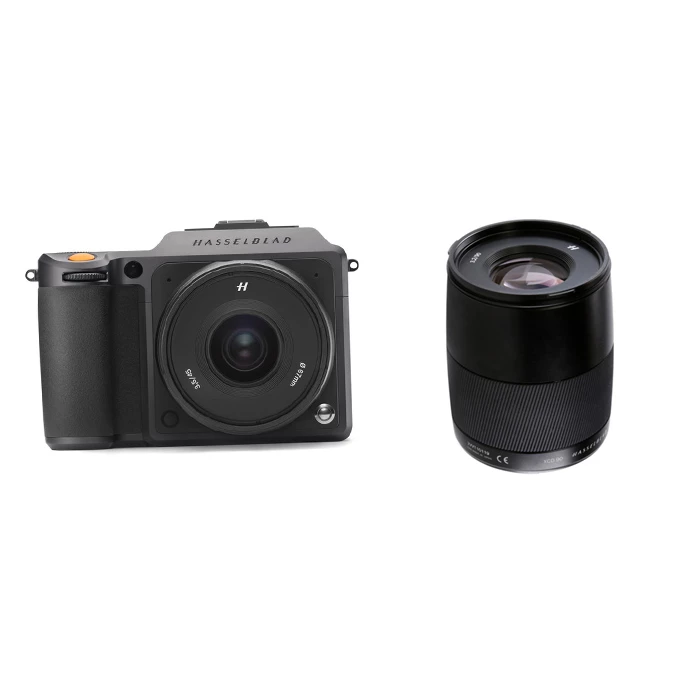
.webp)
.webp)
.webp)
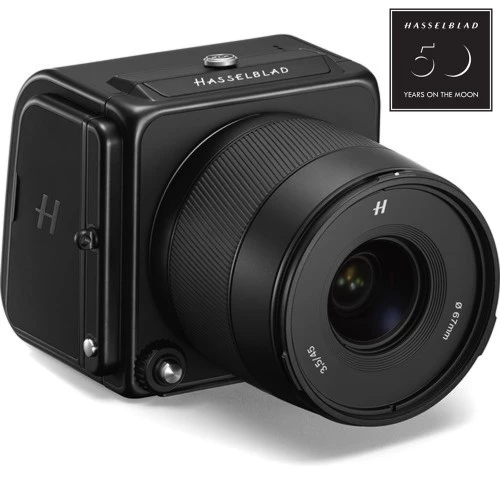
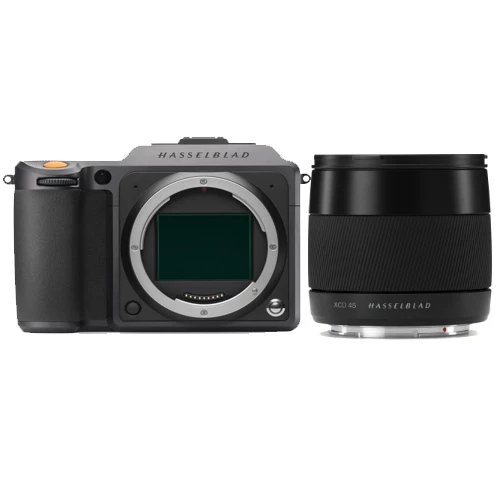
.webp)
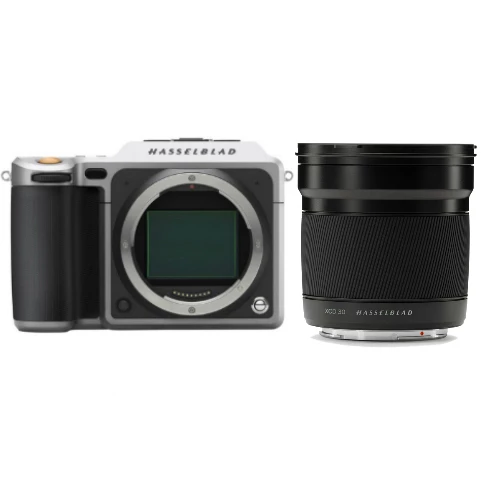
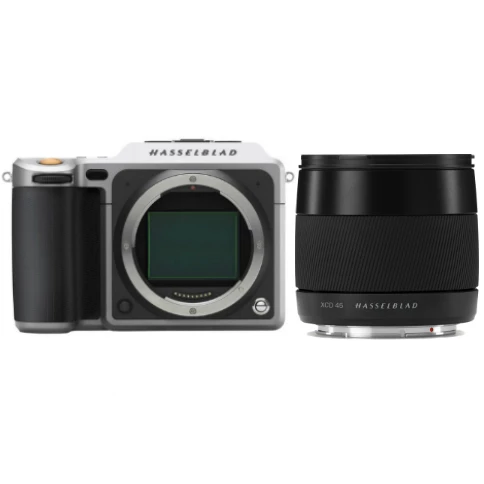
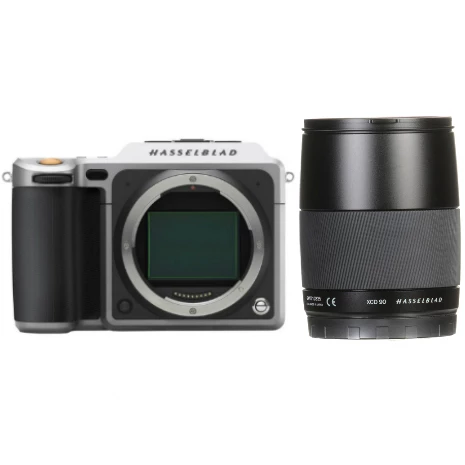
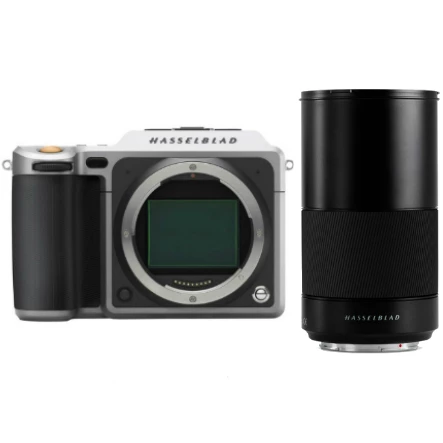
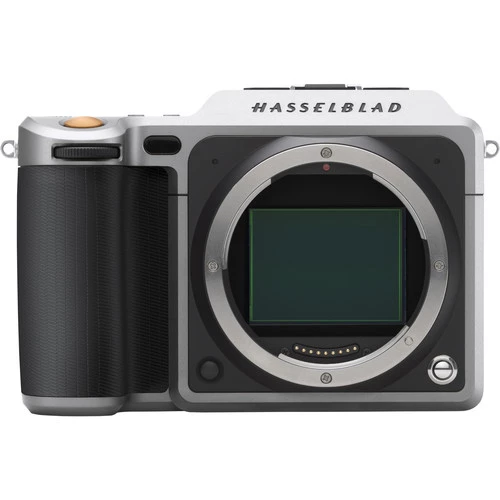
 - 10803.webp)
 - 10804.webp)
